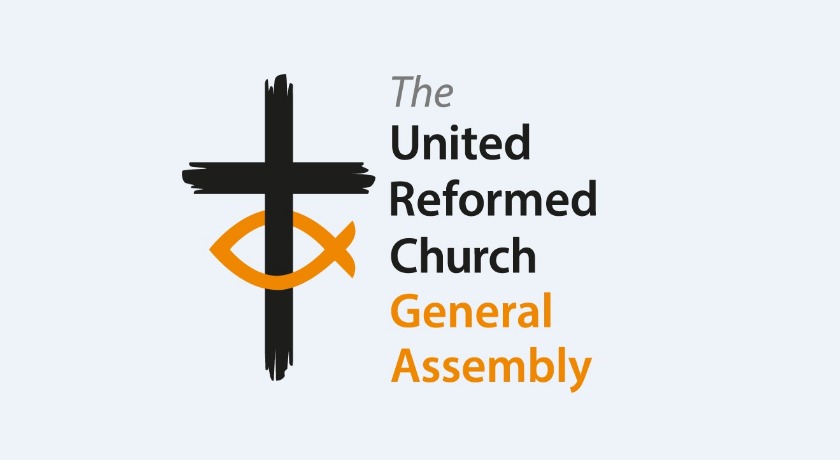 General Assembly, the key-decision making body of United Reformed Church (URC), was held between 9-12 July. Due to the Covid-19 restrictions, the meeting was held digitally.
General Assembly, the key-decision making body of United Reformed Church (URC), was held between 9-12 July. Due to the Covid-19 restrictions, the meeting was held digitally.
The 2021 General Assembly of the United Reformed Church began with the Constitution of Assembly in prayer by the Moderator of Assembly, Peter Pay.
Session One General Assembly
Opening worship
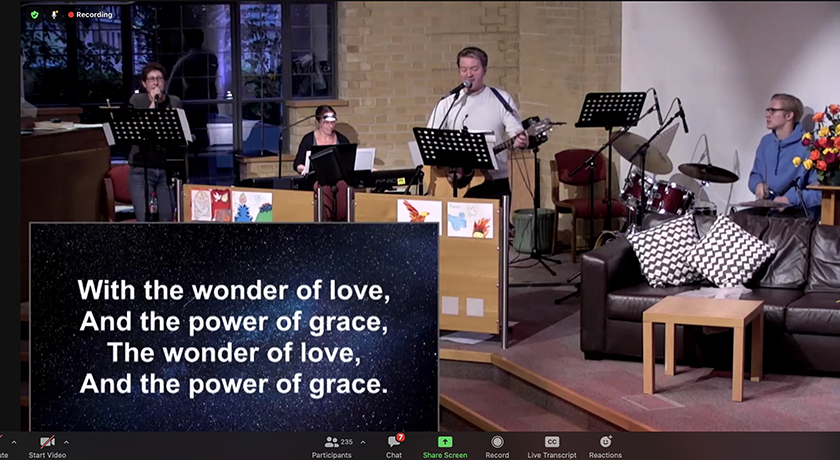 Opening worship was led by the Chaplain to the Moderators, the Revd Helen Everard. The band of Woking URC led Assembly in the hymn ‘Come all ye vagabonds’. The Revd Mike Thomason and Mrs Sue Thomason read from John 4.
Opening worship was led by the Chaplain to the Moderators, the Revd Helen Everard. The band of Woking URC led Assembly in the hymn ‘Come all ye vagabonds’. The Revd Mike Thomason and Mrs Sue Thomason read from John 4.
The Revd Barrie Cheetham, a recently retired minister and volunteer chaplain in Banbury town centre, led the Bible study.
Looking at the story in John 4 about Jesus and the Samaritan woman at the well, Mr Cheetham reflected on its connections with said noted its connections with town centre chaplaincy.
Jesus crossed cultural, social and religious barriers, he said, in talking to a Samaritan woman. “We often do the same as chaplains in Banbury, available to talk to anyone regardless of race, religion, age and social background.”
Another point of similarity, Mr Cheetham said, was how amazingly accepting and appreciative people can be of conversations about faith, even when they distrust organised religion.
This meeting with Jesus was a one-off, like many chaplaincy conversations, but “we don’t know what will be the effects of unexpected conversations and chance encounters.”
Mr Cheetham concluded by asking the Church “to pray for the chaplains in Banbury and everyone engaged in chaplaincy work that we can help people know that they also are loved and accepted by God”.
Act of Commemoration
There followed an act of commemoration for the Ministers, missionaries, Church-Related Community Workers, former Moderators and Clerks who have died since the previous Assembly. It was led by the General Secretary, the Revd Dr ohn Bradbury followed by a prayer from the Chaplain.
Worship concluded with ‘Brother, sister, let me serve you’, sung by the Revd Paul Robinson.
Greeting of Ecumenical and International Guests
The Revd Philip Brooks, URC Secretary for Ecumenical and Interfaith Relations, and Karen Campbell, URC Secretary for Global and Intercultural Ministries, welcomed and read the names of ecumenical and international guests attending General Assembly.
UK ecumenical representatives included: the Right Hon Lord Wallace of Tankerness, Church of Scotland General Assembly Moderator; the Revd Dr David Chapman Chair of Bedfordshire, Essex and Herts District, Methodist Church; the Ven. Vernon Ross, Archdeacon of Westmorland and Furness, Church of England; and Father Dominic Robinson, Parish Priest, Roman Catholic Church; Major David Evans, National Ecumenical and Faith Officer for the Salvation Army.
International guests included: the Revd Najla Kassab, National Evangelical Synod of Syria and Lebanon and President of the World Communion of Reformed Churches; the Revd Lydia Neshangwe of the Uniting Presbyterian Church in Southern Africa and Moderator of the Council for World Mission; Pfarrer Martin Henninger, Evangelische Kirche der Pfalz; and the Revd Dr Munther Isaac, Pastor of the Evangelical Lutheran Christmas Church in Bethlehem.
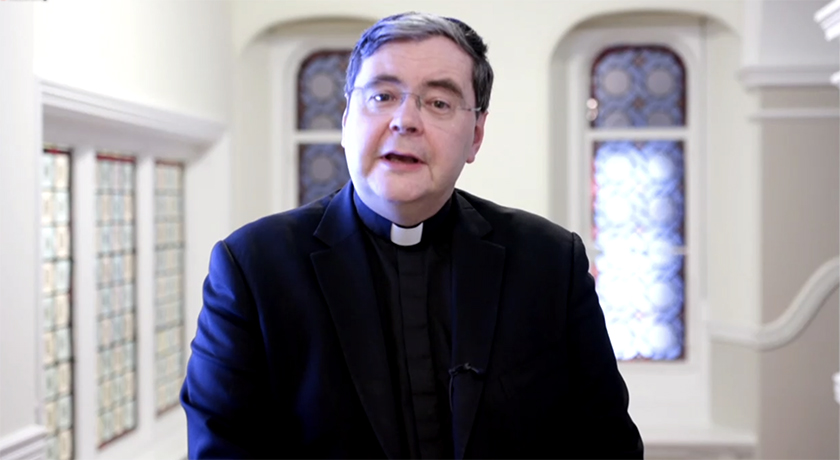 Speaking on behalf of UK ecumenical guests, Father Dominic Robinson, Parish Priest at the Church of the Immaculate Conception in Mayfair: “On all our behalf, thank you so much for the invitation to this United Reformed Church General Assembly it’s a real privilege and a joy to be here this weekend, joining you online.
Speaking on behalf of UK ecumenical guests, Father Dominic Robinson, Parish Priest at the Church of the Immaculate Conception in Mayfair: “On all our behalf, thank you so much for the invitation to this United Reformed Church General Assembly it’s a real privilege and a joy to be here this weekend, joining you online.
“During the last few years, I’ve been involved in the United Reformed Church and Roman Catholic dialogue. It’s been a wonderful experience, and it’s been an experience of sharing our faith, our faith in Jesus Christ which brings all Christians together and, which surely at this time as we emerge from the pandemic, is something we need more and more; to be united as followers of Jesus Christ the way, the truth, and the life.”
On behalf of international ecumenical representatives, the Revd Dr Munther Isaac, speaking from Bethlehem, said: “On behalf of the Palestinian Christian community, a community that is often neglected and ignored, but also greetings on behalf of the Lutheran community we’re so grateful for the relationship and developing partnership we have between our two communities.
“I speak to you from Bethlehem it is here that the greatest miracle of all happened, the incarnation of God, where the Word became flesh and dwelt among us. For me it is always a reminder that God is in solidarity with us, especially as humans in our difficult moments.
“The days in which Jesus was born were by no means easy or peaceful. Yet, it was in these days in a tiny town here in Bethlehem, in the midst of an occupying reality that God came to be with us. This is a reminder that God is with us in solidarity. That God is here to say: ‘I care, I feel, and I hear you.’
“This is what I pray for your General Assembly, I pray that God leads you to translate the words of the Gospel and the meaning of the Good News into Kingdom works of acts of solidarity with the poor and the marginalised.
“That the Gospel is translated into real action among people where we communicate that God is with us especially during these difficult and Covid-19 realties our world is going through. So, all the way from Bethlehem I want to wish you all the best for your meeting over the coming few days.”
En bloc resolutions
The following resolutions were passed en bloc. En bloc resolutions are voted on without debate, having been deemed uncontroversial. This has no reflection on their importance. The full reports and resolutions in each case can be read at urc.org.uk/general-assembly
A1 Mission Council Advisory Groups (resolution 6)
All Mission Council advisory groups become General Assembly groups, now that Mission Council will be meeting only once a year.
D1 Education and Learning: New URC Learning Hub
A report from the Education and Learning Committee on the creation of the URC Learning Hub.
D2 Education and Learning: The Way Forward – One year on
A report from the committee on the implementation of The Way Forward strategy that was agreed by General Assembly last year.
D-H1 E&L/Ministries: Lay Preachers and Worship Leaders
Following Mission Council’s approval, in March, of new pathways into ministry, this paper details the process for becoming a locally recognised worship leader or Assembly accredited lay preacher.
H1 Ministries Committee Report
An update on the work of the Accreditations Sub-Committee and the Assessment Board, particularly on ministry statistics.
H4 Ministries: Changes to Schedule E (resolution 25)
A change to schedule E in the Manual of the United Reformed Church, which lists the different categories of ministers in the denomination.
J1 Nominations: General report (resolution 37)
New appointments to committees.
J3 Nominations: Supplementary report
K1 Pastoral Reference and Welfare Committee Report
A report on the confidential work of the committee, including welfare grants.
T1 Safeguarding Advisory Group: Annual safeguarding report
An analysis of safeguarding annual church returns.
T5 Safeguarding: Safeguarding Training Framework (resolution 48)
General Assembly adopts the Safeguarding Training Framework for use across the Church, to be implemented by synods.
T6 Safeguarding: URC roles eligible for Criminal Records Bureau checks (resolution 49)
An update to the matrix of roles eligible for CRB checks.
Remaindered business from the 2020 General Assembly
The first resolutions passed at the 2021 General Assembly were those meant to have been passed had the meeting took place as usual last year.
Having followed the approval of Synods, which is needed to change matters connected to The Structure of the URC, General Assembly gave its final approval to the proposal that the role of Moderator of the General Assembly change to one person serving for one year, the model used until 2008.
The Moderator may be a minister of Word and Sacraments, A Church Related Community Worker or an Elder. Each synod may nominate one Minister and one Elder each year, but only one Moderator will be elected.
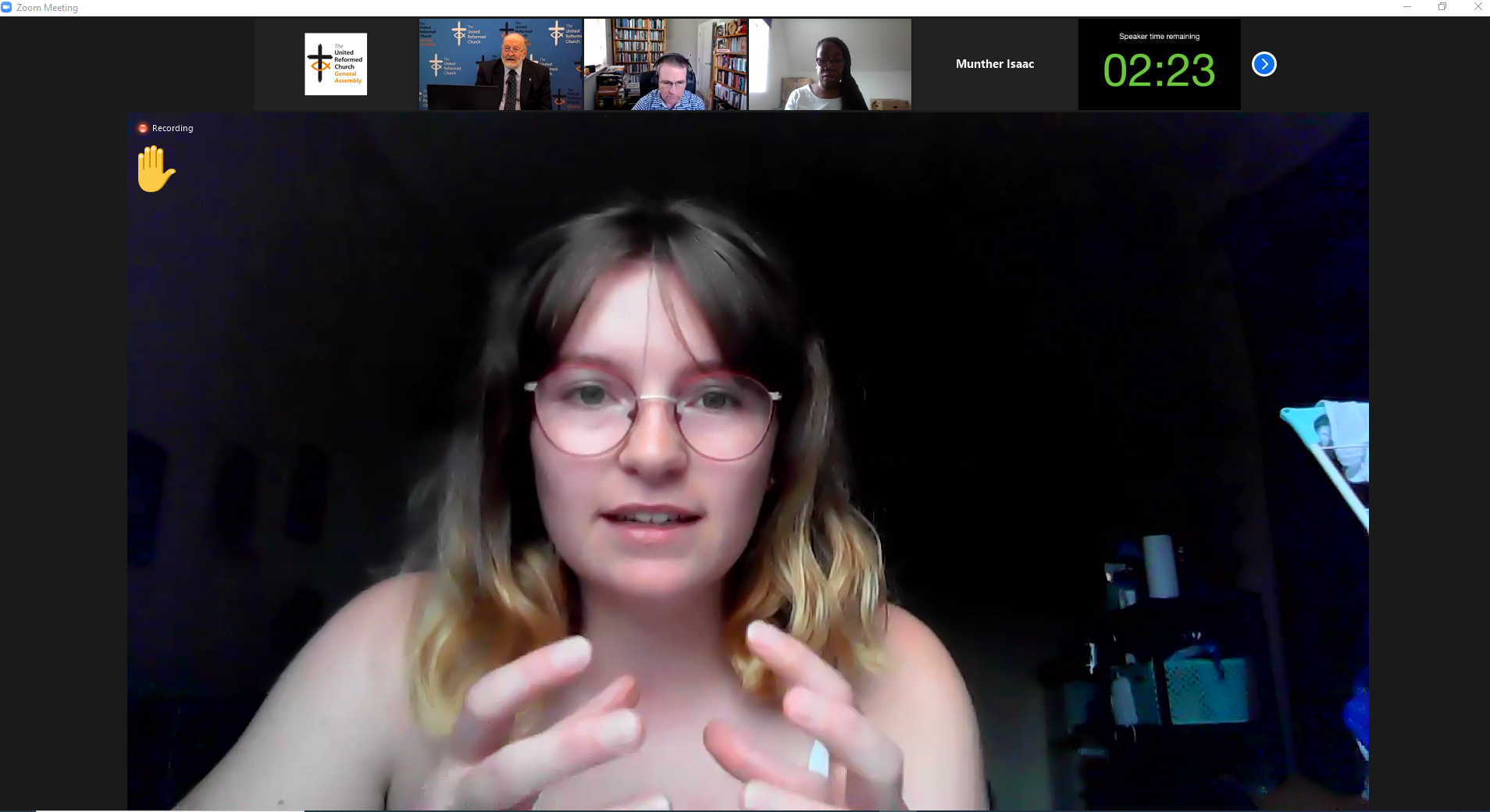 Victoria Turner reminded the Assembly about the representation of woman and minority groups in the role and the Clerk reminded local churches and Synods also to bear this in mind too when putting people forward for nominations for voluntary roles.
Victoria Turner reminded the Assembly about the representation of woman and minority groups in the role and the Clerk reminded local churches and Synods also to bear this in mind too when putting people forward for nominations for voluntary roles.
After a reminder about the reason why the name is being changed, to avoid confusion with the Mission Committee, General Assembly gave final approval to the proposal that the name of the Mission Council be changed to Assembly Executive.
This body will meet each November, to continue the work of the General Assembly and approve the following year’s budgets.
Church Life Review
The Revd Dr John Bradbury, URC General Secretary, addressed General Assembly about the Church Life Review, initiated at Mission Council in March.
John began with a synopsis on why the review is taking place; the pandemic has highlighted strengths and weaknesses that the church has, pension discussions have revealed the complexities of the URC’s financial resources, more than 500 necessary vacancies are needed on the URC’s various committees and groups and they are increasingly hard to fill.
This has all led the URC to grasp the opportunity to take a step back and seriously review various aspects of the life of the denomination.
In consultation with the Nominations Committee, a review group has been appointed to carry out the review. Along with John, the group is formed of the Revds Steve Faber, Dr Tessa Henry-Robinson, Dr Phil Wall and Lindsey Sanderson, and Melanie Campbell, Muna Levin-Harris, Victoria Turner, and Gordon Woods.
At March’s Mission Council, it was proposed that the group present a remit and timescale for work to General Assembly.
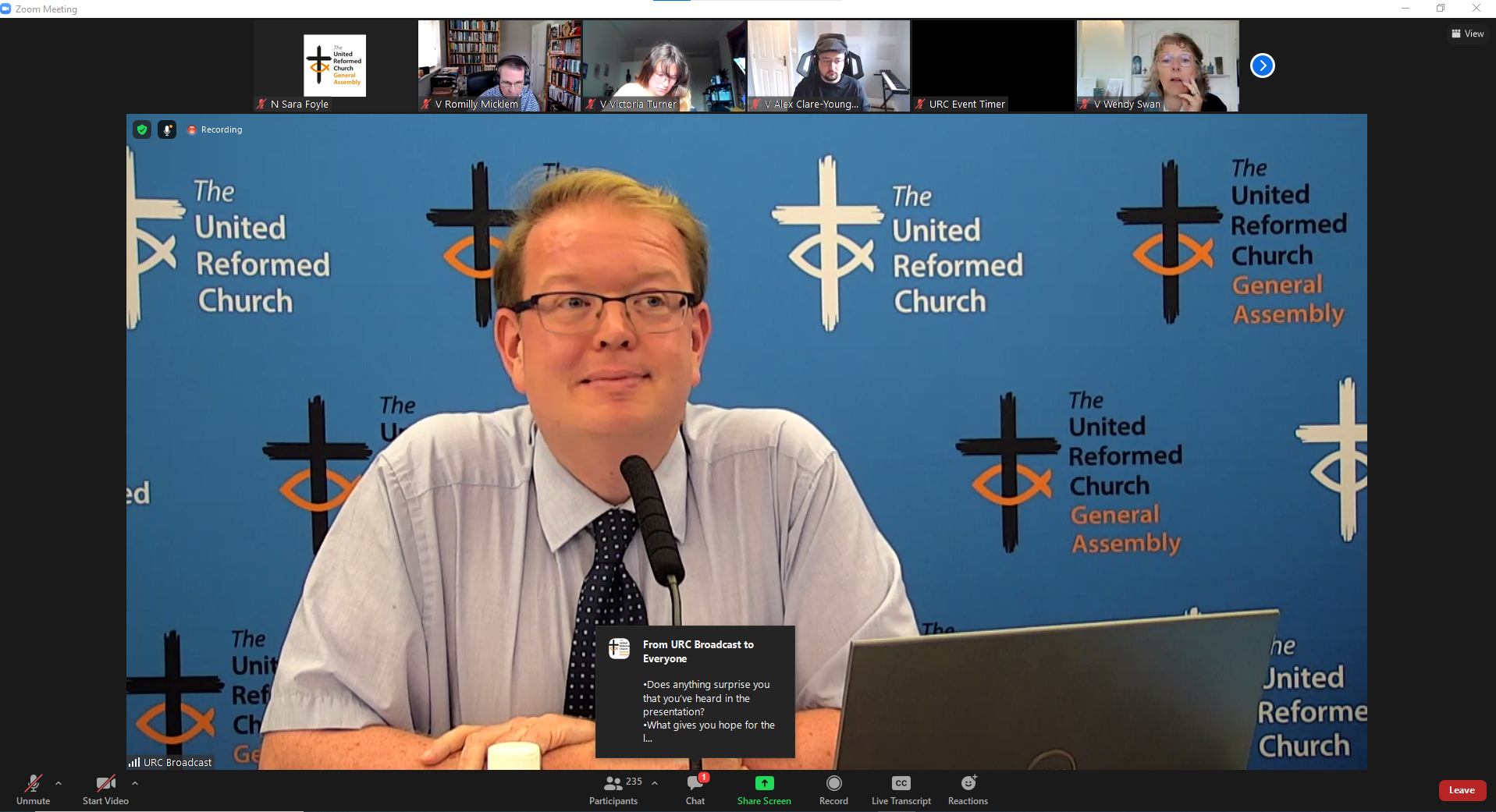 However, John explained that there has been little time between Mission Council and General Assembly and the group has only met once during that period for two hours via Zoom.
However, John explained that there has been little time between Mission Council and General Assembly and the group has only met once during that period for two hours via Zoom.
However, he shared the group’s initial thinking and delivered this through a detailed PowerPoint presentation.
John began the presentation by “reminding ourselves that we were here” and referred to the Basis of Union – to adore God and worship through Christ, to receive and express the Holy Spirit, to be a proclaiming people to declare the reconciling and saving power of the life, death and resurrection of Jesus Christ, and to have a prophetic edge as we bear witness to Christ’s rule over the nations and the life of the world”.
“One key thing that leaps out of that,” said John. “Is the way we express being church ‘in each place, and in our total fellowship.”
John went on to say that this points to a significant set of questions that need answering: “Are we one church, 13 churches or 1300 churches? – and do we need one vision for the United Reformed Church or 1300 visions?
Since District Councils ceased to be, part of our reality has been that 13 different Synods have developed 13 sometimes very different ways of working.”
In the PowerPoint presentation, which is available on the URC General Assembly papers website, John highlighted statistics regarding the numerical decline since 1972. The stats presented accurate figures from 2008 then projected those figures forward on the same basis.
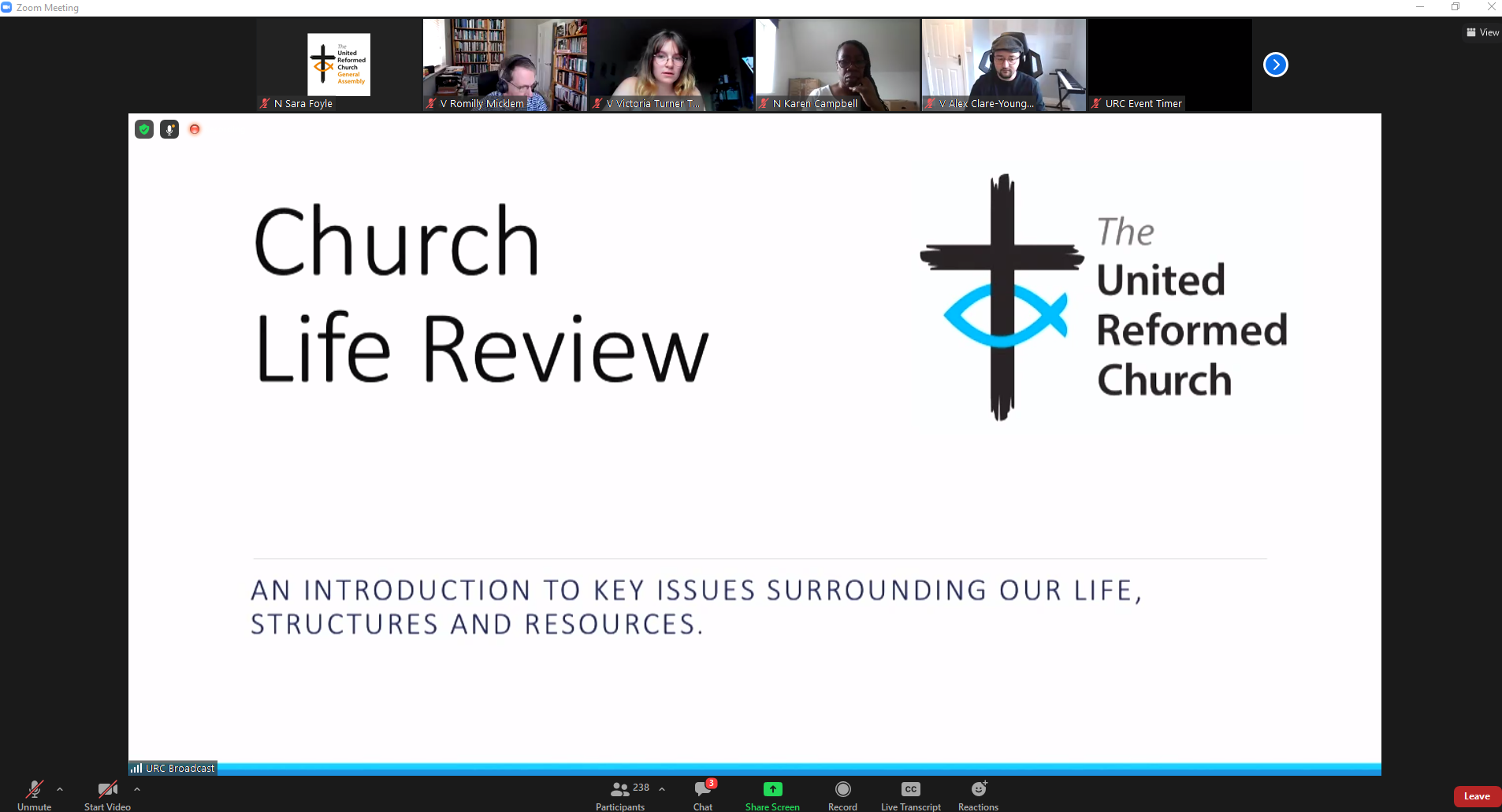 The statistics showed that by 2031: the URC will probably be a Church of around 25,000 members gathered in about 1,100 congregations, stipendiary ministers would number around 150, the average number of congregations per stipendiary minister would be 6+, and that the decline in serving and non-serving Elders is faster than the decline in the number of churches, leaving fewer local leaders to become overloaded and overwhelmed.
The statistics showed that by 2031: the URC will probably be a Church of around 25,000 members gathered in about 1,100 congregations, stipendiary ministers would number around 150, the average number of congregations per stipendiary minister would be 6+, and that the decline in serving and non-serving Elders is faster than the decline in the number of churches, leaving fewer local leaders to become overloaded and overwhelmed.
Other difficulties included not knowing what would local congregations most welcome in terms of support from the wider church for this worship, witness, evangelism and service.
John went onto show the various committees, advisory groups and departments that made up the structure of the URC, advising that a picture is painted of “a rather large and complex organisation, for a fairly small church”.
To paint a rough picture, there are 11 committees that report directly to the General Assembly, six advisory groups or task groups that report to Mission Council, (soon to be the Assembly Executive), the Assembly Committees and their work are grouped into departments at Church House which is overseen by three Deputy General Secretaries.
Each of these departments have a range of sub-committees and task groups.
In regard to the URC’s Trust structure, John explained that there are two main trusts supporting the work of General Assembly, the URC Trust and the Pensions Trust, and then 13 separate trusts that sit behind the work of the 13 Synods.
Financial resources showed – through looking at accounts submitted to the Charity Commission – that annually, the central church spends around £19.7M and Synods spend £14.6M on the actual work of the synod, not manses or large capital items.
Stipendiary ministry of Word and Sacrament and CRCWs and the related on-costs of National Insurance and Pensions are paid by the General Assembly from the M&M giving of local churches. Annually this expenditure amounts to nearly £14m.
However, the budget set each year is just over £5.5M. John said: “I confess I was rather startled, given the pressures on ministers, and the desire of so many local congregations to be able to access more stipendiary ministry than is currently possible, that we only spend about 40% of everything that we spend between the General Assembly and Synods on stipendiary ministry – and not all of that is spent on ministers in local churches. That figure includes 13 Synod Moderators, 5 ministers and CRCWs at church house, and ministers in Synod, rather than local roles too.”
In relation to Synod assets, John went onto show that as more and more congregations close and buildings sold, the net assets and investments held by Synods is increasing but the disparity in property values between Synods means that what one receives when a building closes varies hugely.
John also explained that as a whole the URC was worth £204m in 2019, up from £177m in 2018. He added: “As the family of the URC, we need some serious conversations about how we handle our rapidly increasing wealth, in the context of a church declining in terms of people.”
In conclusion, John advised that the review group needed more information and understanding on who the URC is, where it currently is and what it is doing, and what the hopes, visions and dreams of its congregations are.
Addressing these questions will help the group think about what it needs to focus on, help the group explore what new things might be initiated, and in turn gain a far better sense of how the URC spends its money and resources more wisely for the greater benefit of all.
John said this is a journey barely begun, but the group plans to have informed conversations and two residentials hoped to be arranged in the autumn to begin.
General Assembly then gathered in buzz groups to discuss an array of questions to assist the group in its work.
Questions included: what gives you hope for the life of the URC, what new work would you love to see the group engage with, what do you think the group might most helpfully need to find out about the URC’s existing life to help it think about the URC’s future life.
Session 2
Finance Committee
Despite the pandemic, central budgeted funds were in surplus in 2020, began the reports from the Finance Committee.
The impact of coronavirus will be monitored at all levels of the church, as it will be some time before the committee can assess what bearing it has had on the Church’s future financial state.
As a result of the generous giving of most congregations to support the central fund, and with the financial support of Synods, M&M contributions were a little more than half a million down on the £18.5 million budget expectations, with total income reduced by just a little under £750,000 compared to the budget.
At the same time, budgeted expenditure was cut by more than £900,000, leaving the fund with a small surplus of almost £95,000.
It was extremely difficult for the committee make firm budget projections for 2021. However, it persuaded Mission Council to adopt the budget despite the uncertainties about future income.
The projected outcome is a deficit in the year of £358,000, which will be met from the URC Trust’s reserves.
URC Pensions schemes
Through a video presentation available before the Assembly and in the committee’s report, Ian Hardie and John Piper, the URC’s Treasurer and Deputy Treasurer, told the Church that the challenges faced by our pensions schemes was a family problem requiring a family solution.
The future of the schemes should not be kicked into the long grass to leave for our successors to deal with. Rather, action to lay the groundwork for future changes is needed now.
John Piper explained that the URC has done nothing wrong.
The annual costs of the Ministers’ Pension Fund are about to rise because the Pensions Regulator has insisted on even more of a prudent approach, on top of the substantial increase in costs caused by continued low interest rates.
Papers G3 and G4 looked at challenges from the past and in the future.
The valuation, John Piper explained, that takes place every three years in 2018 had reported a £9m surplus. But that has changed and the likely valuation in 2021 will be a £25m deficit.
The committee knew the challenges were coming and are making plans accordingly.
In the last two months, offers of up to £45m have been made – “amazing and humbling”, Mr Piper said.
He asked the Assembly to express it thanks for the generosity, and explained that those offers would need to be agreed by the bodies that had offered them later this year.
Paper G4 included three interlinked resolutions.
Resolution 19 offered a basis for what the church will do, not to reduce the pensions of office holders or staff, but aiming to provide good pensions in a different and sustainable way.
John Bradbury, the General Secretary, explained that because of the conflict of interest of those in the scheme, advice had been sought from the Charity Commission and an Order to address this issue has been granted.
It said that the Trust was able to take direction from General Assembly without those in the scheme having to recluse themselves. The URC being a conciliar church, the Trust may take the decision of the assembly to guide all, and also applies to Synods.
The Revd Steve Faber wondered if part b) of the resolution was honourable, because of the potential risk of 50% of the entitlement being at risk.
John Piper said that the principles in the resolution lays down markers against which future decisions should be judged.
Morag Donaldson asked if the changes were applicable in Scotland where pensions laws differ. Romilly Micklem said the Pensions Regulator is not devolved and so its decisions apply to the whole of the United Kingdom.
The resolution was carried.
Resolution 20 asked for a decision in principle on the understanding that the two schemes would carry on as before until detailed proposals are presented to be agreed by a future assembly.
Resolution 21 asked for the authority to detail those proposals using money not currently in the budget.
Extra prudence in the valuation on top of low interest rates would mean huge rises in contributions.
Employers contributions would cost 2.1m in 2020 and the estimated cost is 3.8m in 2022. By 2030 the contributions would be 4.2m, an increase of 45%. Are these increases affordable and value for money, Mr Piper asked.
Almost all the income comes from M&M fund, and the church is fortunate that it can afford this for now.
The objective, Mr Piper continued, is to provide equivalent benefits at a sustainable cost in a well-managed scheme.
After discussions in buzz groups, a number of comments were made.
The Revd Steve Faber asked if the Pensions Trust would provide financial support so the best advice could be given.
Clare Nutbrown-Hughes asked what kind of ongoing financial commitment would the Church have and what costs would be needed?
Andy Braunston asked if more work could be done on the percentages of contributions.
Scott Wheeler wondered if advice available to retiring ministers about the options on final options on their pensions.
Alan Yates asked how the 45% increase projected before 2030 included the £45m offered to the schemes.
John Piper responded by saying that advisors cost around £100,000 per year, a cost that would continue, and that deficits may continue. But, he added, as pension schemes mature, assets are moved into less risky investments, and the likelihood of liabilities would reduce. Any new scheme would include advice for all members.
David Thompson wondered whether there might be the possibility of reversing the order of 20 and 21. Further work has to be done, he said, but a lot of very careful work has been done already. Defined Contribution is the way forward, he concluded.
Steven Manders asked if members are fully equipped to understand the extent of the changes, and that the implications are so serious that they need to have more information from sources independent of the URC.
Andrew Atkinson was grateful for the huge amount of work already done and mirrored Victoria Turner’s comment that the Social Justice Network had reservations about changes to the schemes and its impact on vulnerable people.
In his responses, John Piper said extensive Information and advice would be provided by the provider, the church and from those who are independent.
Resolution 21 being taken first could raise further issues about balancing the M&M fund, and at least two years of increased contributions.
The concerns raised about the impact of vulnerable people would be addressed.
Alex Clare-Young said that the Church was between a rock and a hard place and acknowledged that it was difficult to make decisions at this point.
He believed advice from an independent specialist could be made to mitigate possible injustices.
He proposed an amendment which was accepted by the committee for Diversity, Equity, and Inclusion (DEI) specialists to be consulted in the process in the run up to the next round of decisions at next year’s General Assembly.
Victoria Turner said that there are wider moral and ethical issues in the protection of employees, and Romilly Micklem said that lengthy discussions about ethics, morals and stewardship had taken place.
He further shared that there are two separate sources of free advice already available to members of the schemes.
The amended resolution was remaindered to a later session.
Election of Moderator of General Assembly 2022-2023
The Revd Nigel Uden, former Moderator of General Assembly, chaired the election of the next Assembly Moderator.
After making presentations to introduce themselves to the Assembly, the candidates were each asked to speak on the question: ‘In these days of change for the United Reformed Church, how do you understand the role of Moderator of its General Assembly, and what would you hope to bring to it?’
Voting is now open, and the result will be announced on Sunday morning.
Paper I1: Mission Committee Report
Sarah Lane Cawte, Convenor of the Mission Committee, presented this report on the work of the committee over the past year. It includes updates on Church and Society, Ecumenical and Interfaith Relations, Global and Intercultural Ministries (including Commitment for Life), Mission and Evangelism, Fresh Expressions and Rural Mission.
Paper I2: Israel Palestine Report
Sarah Lane Cawte, Convenor of the Mission Committee, along with the Revd Philip Brooks, Secretary for Ecumenical and Interfaith Relations, presented this paper to General Assembly. The paper includes ten resolutions to further the URC’s solidarity with Palestinian Christian communities. The resolutions ask the United Reformed Church to support Palestinian partners through pilgrimage, lobbying, ethical investment and trade.
Mrs Lane Cawte said that the paper followed on from previous Assembly resolutions on Israel and Palestine in 2016, 2018 and 2020, but now focusing on action where they focused on principle. The resolutions have been worded carefully, after consultation with relevant parties, Ms Lane Cawte said, so she asked Assembly where possible to focus on the substance resolution in each case, rather than amending the wording. She thanked URC Youth for their response and comments on the paper.
Assembly heard a recorded message from the Revd Dr Munther Isaac, the Minister of the Evangelical Lutheran Christmas Church in Bethlehem, thanking the URC for debating these proposals. Dr Isaac said that the resolutions were not anti anyone, but addressed the unjust situation in which Palestinians and Israelis find themselves. He thanked the URC for listening to Palestinian Christians and urged them to go beyond good wishes and take a stand for justice. Without Churches putting pressure on Israeli government, he said, peace could not come in the Holy Land.
Members of Assembly had questions on some of the resolutions. Asked why resolution 26 specified engaging with Christians, Ms Lane Cawte said this was not intended to be exclusive, but was a matter of deepening existing relationships.
On resolution 30, where Assembly ‘urges’ the Israeli government to abide by international law, the question was how such urging is supposed to be conveyed. Mr Brooks said the answer to that was to be found in the following five resolutions.
As resolution 31 asks URC members to contact their MPs, members of Assembly asked for suggested wording to be provided. While the Mission Committee would not be averse to that, it was pointed out that MPs respond much better when people write in their own words. Asked if people might contact the Foreign Office as well as their MPs, Mr Brooks explained that direct approaches from voters to any government department would be ignored, but if one can get one’s MP to do write to the Foreign Secretary, the minister is obliged to respond. In response to a request for a simplified version of the information in paper I2, Mr Brooks said that the 22 people who went on the URC pilgrimage to the Holy Land in 2019 were available to come and talk on the subject.
Resolution 33 asks synod trusts not to invest in companies facilitating certain activities. It was pointed out that trusts can never be certain about where all their investments are, and so the phrase ‘ensure that they do not invest’, was changed to ‘avoid knowingly investing directly’.
Resolutions 26-33 were all passed by large majorities. Because of time strictures, Assembly did not vote today on resolutions 34 and 35, and will return to them later.
The second day of General Assembly began with worship led by the Chaplain to the Moderators, the Revd Helen Everard. The band of Woking URC led Assembly in the hymn ‘All creatures of our God and King’. A number of young people read from Job 12 and Matthew 7.
Opening worship
The Revd David Coleman, Environmental Chaplain of Eco Congregation Scotland, led the Bible study. He asked Assembly which Bible character was mentioned between 800 and 1,000 times, second only to God, one who you deal with daily, depend on, but disregard, who is treated as less than human, but called by God to be a witness. The answer is… the earth.
In Jesus’ story of the two builders, on rock and sand, said Mr Coleman, ‘neither builder could dictate to the wind and rain, but one of them ignored that voice and the other was prepared to be taught and survived.’
It is not idolatrous to revere God’s creation, he said: ‘There is no competition between God and what he has made. Gratitude to the earth is no more inconsistent with the praise of God than honouring our father and mother.’ When we see the harm we are doing, and yet carry on, the heart of God knows sorrow. The earth has God’s attention.
We are told, said Mr Coleman, that acting now, there is scope for a just transition to sustainable living. Are we going to take notice? Being a Christian today, he said, ‘it matters far less whether you are progressive or conservative, as long as you employ empathy and relationship and escape from the idea we own the earth.
Worship concluded with prayers led by young people on video, and the song ‘All through history’, led by the Woking URC.
Session four
Celebration of newly ordained ministers, commissioning of CRCWs and Jubilee Ministers
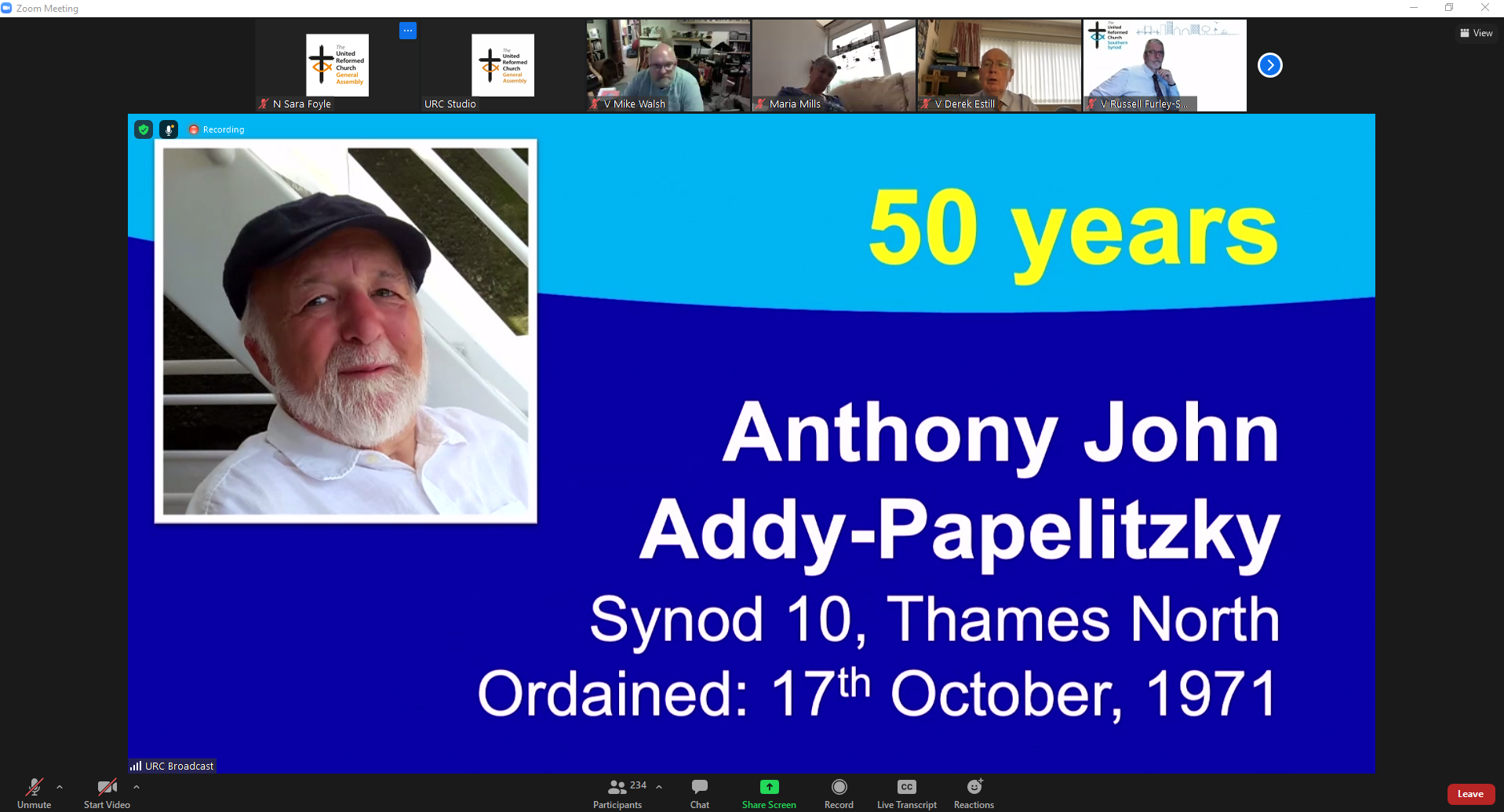 Ministers celebrating the Jubilee of their ordinations in 2021 were recognised through a PowerPoint presentation.
Ministers celebrating the Jubilee of their ordinations in 2021 were recognised through a PowerPoint presentation.
The Revd Basil Ernest Bridge, celebrates 70 years on ordained ministry.
The Revds Derrick Peter Ackling, Kenneth Douglas Alway-Jones, Marjorie Ayton, Arthur Jack Beeson, Anthony Gerald Burnham, David Vandepeer Clarke, Wilfred Kievill Gathercole, Michael Edmund Heard, Max Armstrong Moore, David Cranford Morgan, Barry Richard Parker, Roger Kaye Scopes, Brian John Slater, John Malcolm Smith, Harold Robert Tonks, Alan David Trinder, and Adrian John Wells celebrate 60 years of ordained ministry.
The Revds Anthony John Addy-Papelitzky, John Colbeck Durell, Graham Beresford Edwards, Anthony James Lawford Jones, Barbara Meachin, Terry Oakley, Michael John Bemrose Spencer, Brian Sadler Stone, Alan Edward Thomasson, Colin Peter Thompson, and Michael John Wear celebrate 50 years of ordained ministry.
There were no Church Related Community Workers commissioned this year.
The Revds Stephen Manyeh Ansa-Addo, Lee Barbara Battle, Sarah Louise Fitton, Ceri Ann Gardner, Susan Henderson, Aiyana Aurora Gardner-Houghton, James Hamilton, Daniel Rawdon Harris and Matthew James Rigden, were welcomed and congratulated on becoming newly ordained ministers.
The Revd Helen Everard expressed gratitude, saying: “We give thanks for those who have been newly ordained during the pandemic, and we give thanks for all those who have completed such amazing years of service.” She then read a specially written prayer by the Revd John Proctor, former General Secretary of the URC.
Paper H2: Disciplinary Policy for Office Holders
General Assembly adopted the disciplinary policy for office holders, who are not Ministers of Word and Sacraments, Church Related Community workers or paid employees.
Disciples occasionally go astray and need discipline to remind them of expected standards. Having a clear and established process in place for unacceptable actions will prevent misunderstandings and protect the office holder and the denomination, the paper from the Ministries Committee said.
Whilst rooted in the local church, there is provision for Synods also to start this new process.
The Revd Paul Whittle, Convenor of the Ministries Committee, said that complaints can go in all sorts of directions, but when it comes to office holders in Synod or congregations, there was no obvious mechanism for dealing with them when a complaint is made. “I wish this piece of business was not needed, but it is.”
The Disciplinary Policy for Office Holders described the process to be put into effect when office holders are alleged to have committed a breach of discipline, recognising the need to be fair and impartial when dealing with disciplinary issues.
The Gospel requires, the paper continued, repentance as well as forgiveness, modification of behaviour as well as personal support and care.
Following a number of clarifications and reminders about existing policies and codes of conduct, and that the policy would require refinement in due course, Nicola Furley-Smith said the committee was working towards the right policies in the right place in right order, and this was deemed to be the priority which is why it has been committee first.
John Bradbury reminded Assembly that minor amendments could be brought to later meetings of the Assembly Executive (formerly known as Mission Council) rather than amending detailed policy documents on the floor of the Assembly.
After several comments there was a motion to refer the policy back to the Committee. This was resisted by the Convenor and Secretary for Ministries, who said the policy was needed now and it was still being worked on. The motion was lost.
Alex Clare-Young proposed an amendment to prevent injustice asking that a list from the Equalities Act was included. The addition of “disability; gender reassignment; marriage and civil partnership; pregnancy and maternity; race; religion or belief; sex; sexual orientation” was accepted by the Ministries committee, and the Assembly.
After a comment by Keir Hounsome, John Bradbury said that the church was more exposed legally without the policy and that the work on it was ongoing.
Mal Breeze offered his support of the work and reminded the Assembly that if we start pulling things apart that the work of the church’s committees could be undermined.
Paper G-H1: Stipendiary Ministry Targets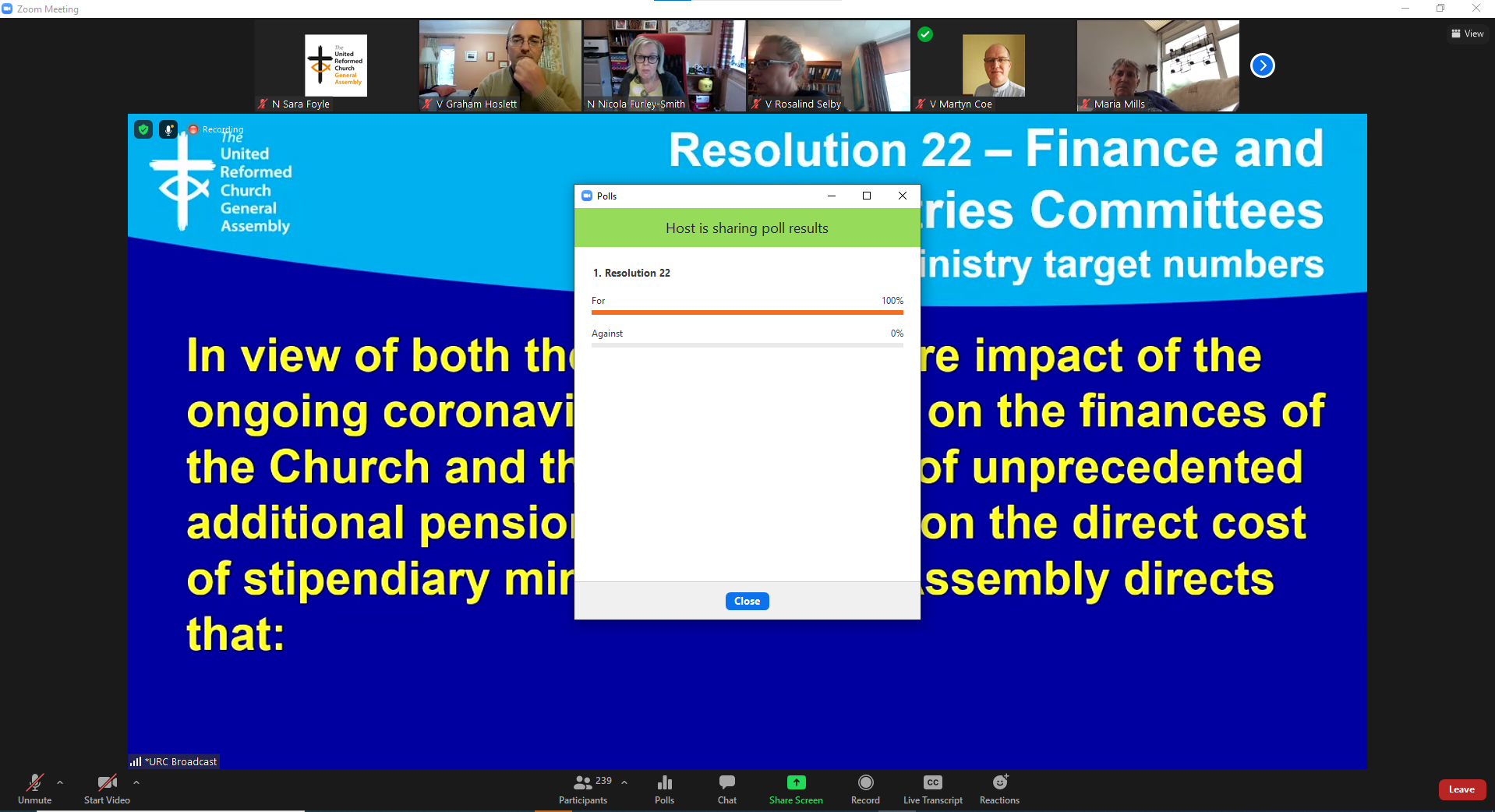 Resolution 22 from the Finance and Ministries Committees was intended to prevent large and unforeseen cuts in the target number of ministers due to a policy previously agree by General Assembly.
Resolution 22 from the Finance and Ministries Committees was intended to prevent large and unforeseen cuts in the target number of ministers due to a policy previously agree by General Assembly.
Since 2012, the target number of stipendiary ministers was set so that their cost was in line with trends in the membership of the Church.
Originally intended to keep ministerial numbers in line with M&M contributions, in practice this has not happened – church membership has reduced faster than the contributions.
Increased pension costs during the next few years would dramatically cut the target number of ministers from 2022 if the policy from 2012 remained in place.
The resolution allowed time for a better solution to the 2012 policy to be addressed while avoiding any impact on the number of ministers in the short term.
Romilly Micklem told the Assembly that the contributions from the membership doesn’t cover the cost of ministers.
Paul Robinson wondered how this work would relate to the new Church Life Review Group.
John Bradbury told the Assembly that this was enabling resolution.
Rosalind Selby asked if the number ordinands would be affected and after an assurance that it wouldn’t, the resolution was carried.
Session 5
Papers T2-T4: Safeguarding Governance
General Assembly passed Resolutions 44 and 45 to make changes to the Structure and Rules of Procedure to ensure safeguarding is foundational in the Church’s journey to becoming a safer church and gave the authority for further action when necessary.
The responsibility for safeguarding lies with everyone and the changes were made after extensive consultation.
T3 – Safeguarding Committee
General Assembly agreed to disband the Safeguarding Advisory Group and established a Safeguarding Committee as a standing committee of the General Assembly. After a discussion about membership to always include a member from the National Synod of Scotland, where practice differs, the resolution was carried.
T4 – Safeguarding policy statement
General Assembly adopted the new safeguarding policy statement and commended it to church meetings, Elders’ meetings and Synods for consideration and implementation.
This policy sought to underpin safeguarding through all councils of the Church and provided an important reference point in its governance.
Community Awards Presentation
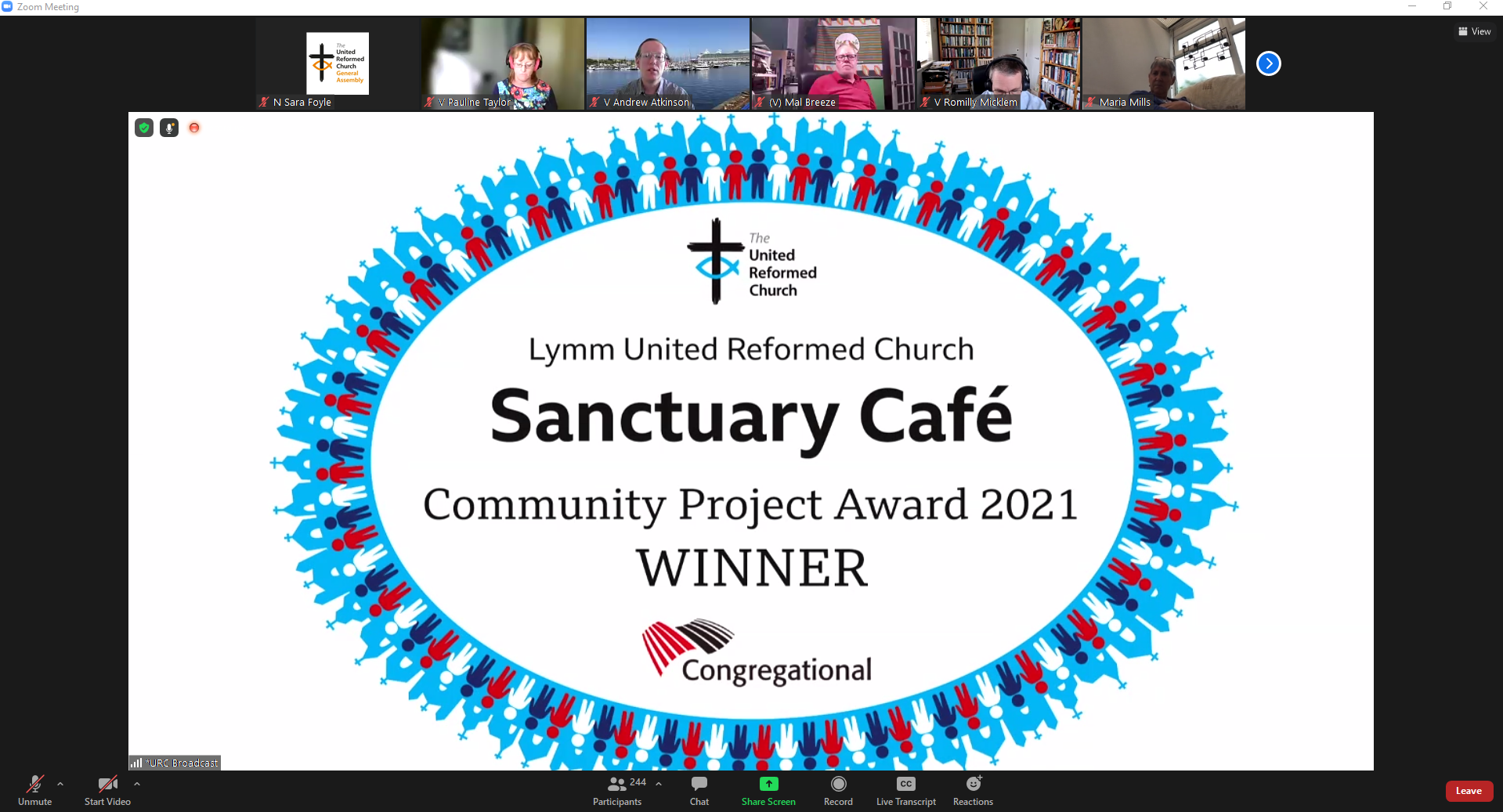 Margaret Slater, Head of Marketing at Congregational, introduced to the Assembly the winners of the 2020 and 2021 Community Project Awards, a scheme run by the United Reformed Church in collaboration with Congregational and Reform magazine.
Margaret Slater, Head of Marketing at Congregational, introduced to the Assembly the winners of the 2020 and 2021 Community Project Awards, a scheme run by the United Reformed Church in collaboration with Congregational and Reform magazine.
The Awards recognises inspiring and innovative community projects in local churches with a URC connection, ones which meet a local demand and have a positive effect on community life.
“One of the positives of the pandemic,” said Margaret, “is that we’ve seen how important it is to be part of a community and how much we need to interact with other people, so the Community Awards are even more significant this year.” She said that all the winners had a lot to be proud of.
This year’s five winners are:
- Spire Cafe, a church-based community cafe at the Spire Church, Farnham, a URC and Methodist LEP in Surrey
- Chorley Repair Cafe, which repairs items and shares repair skills with the community at Chorley URC
- Sanctuary Cafe, a cafe, bookshop, events centre and community hub at Lymm URC near Warrington
- Messy Vintage, a service of activities and worship for people held at Shrewsbury URC
- The Food Project, which provides free food to people who need it, at Lea Road URC, Wolverhampton.
The winners each received prizes of £2,000 to further their work.
There will be full reports on each project in coming issues of Reform and videos about the projects are available on the URC YouTube channel.
Paper X1: Modern-day Slavery
The Revd Steve Faber, Moderator of the West Midlands Synod, presented two resolutions to General Assembly relating to the creation of a denominational policy statement on the issue of Modern-day Slavery.
The first (resolution 50) concerned the research and preparation of a proposed policy for Church House and Assembly business that is to be presented to the Assembly Executive (formerly Mission Council) or General Assembly no later than the Assembly meeting in 2023. The second (resolution 51) tasked the Safeguarding Advisory Group/Committee to draft clear guidance that will help churches and individuals identify those subjected to the abuse.
“There can be no doubt that Modern-Day Slavery is one of the biggest injustices active in our world today. One estimate suggests it is the most profitable illegal activity in the world only after the supply of narcotic drugs,” Steve said. “Precise figures are impossible to obtain, precisely because this is work carried out illegally, but the International Labour Organisation estimate that right now there are more people in forced servitude, forced sex work, forced marriage, and subject to human trafficking including organ harvesting than the total of all who were captured and sold through the Transatlantic Slave Trade. General Assembly is rightly and very properly concerned with the legacies of that slavery. We must, though, also be concerned about those living through these abuses now.”
Steve said that as General Assembly is being asked to consider proposals about divesting from companies involved in human rights abuses in Israel and the Occupied Palestinian Territories, so it should be concerned about divesting from companies involved in modern-day slavery.
Steve then moved onto resolution 51 and began by explaining to General Assembly how the West Midlands Synod has helped its world church partner in West Bengal, India, to fund the construction of a hostel for children from impoverished families at risk of human trafficking, and over several years it has been able to contribute towards their housing and education. The Synod has also been able to partner with the Church of North India to safeguard vulnerable children.
“But,” continued Steve, “modern-day slavery also affects our own communities, from the inner-city to the suburban to the rural – it is present in some form or another in almost every community in the UK.
“We know that car washes and nail bars as well as domestic servitude are frequent areas of exploitation and slavery in the UK, but as listeners to The Archers will know, it is much broader than something that happens to migrant communities through international trafficking. White British people are also subject to forced labour. The breadth and depth of the issue are horrifying.”
Steve said much more information and guidance was needed for churches to help them identify the abuse that is often happening on our doorsteps but hidden in plain sight.
Steve was supported by Mervyn Davies, Finance Officer for the West Midlands Synod, who called the incidence and prevalence of modern-day slavery a “shocking injustice”. Mervyn explained how we could be complicit in the abuse by not being rigorous in our spending and investing habits, naming the clothes we where to the cocoa we have before bad as opportunities.
Mervyn also explained how as a finance officer, the Institute of Chartered Accountants, of which he is a member, has been training people in writing modern-day slavery statements since 2016. Mervyn highlighted and congratulated the steps the URC has already taken on the issue from which it can build saying: “The investments of URC Trust and Ministers’ pension are with CCLA who have already signed up to the Find it, Fix it, Prevent It initiative to not invest in companies tainted by slavery, after making enquiries of Synod’s investment managers they too, last month, have now signed up; the URC has already committed to pay the Real Living Wage; and many members of the denomination already buy Fairtrade.
Steve and Mervyn were thanked from the floor for bringing this important subject to General Assembly and both resolutions passed with virtually no objections.
Session six
Paper E1 and E2 Equalitiies Committee
The Revd Anne Lewitt, Convenor of the Equalities Committee, presented Paper E1: Equalities Committee and Paper E2: Affirmative action towards an anti-racist church.
Anne did not move a resolution in Paper E1 but shared with General Assembly a summary of the Committee’s work since a previous report was made in 2020.
Anne advised that the remit of the Equalities Committee is to remind the denomination that equality is enshrined in its theology, life and work, and to challenge the practice of the URC where appropriate, and that the URC affirms its commitment to show the same openness to all people in today’s world as Jesus did in his day.
As such, Anne highlighted that a ‘Diverse Gender Identities and Pastoral Care’ was recently mailed out to ministers and expressed delight at proposals in Children’s and Youth Work Committee’s Paper B2 about making committee meetings accessible to all. More copies of the booklet are available. Anne directed people to contact herself or Karen Campbell to receive a copy, or visit the Church of Scotland’s website where it can be downloaded for free.
Four resolutions were presented in Paper E2 which focused on the addressing the underrepresentation of Black and ethnic minority people in Assembly-appointed posts.
“The very obvious racial imbalance in positions of high visibility and influence within the URC is both a concern in itself and has a wider influence in the denomination.” Anne said.
“We therefore bring these resolutions as a small but important step on the road towards becoming, and being seen to become, an actively anti-racist church. They represent affirmative action. Something which we can do and should do.”
A lively discussion was held, which included Andy Middleton, the URC’s legal advisor, reminding General Assembly to take acre in wording any policy.
The Revd Nicola Furley-Smith, URC Secretary for Ministries, confirmed that her committee and Education and Learning Committee was already engaged in developing a programme to develop skills in people who are considering applying for an assembly-appointed post.
Karen confirmed that that the small group, as stipulated in the paper, would seek to compliment work already being undertaken. Some Assembly members sought clarification on how nominations and applications were made.
The Revd Dr John Bradbury, URC General Secretary, clarified the main two ways; that people are recruited to Assembly-appointed posts through nominations or by direct applications, that these appointments are advertised in Reform magazine, the URC website, social media, and circulated direct to Synods, who in turn circulate the vacancies through their networks to ministers and so forth.
John did, however, say that most applications whether nominated or directly applied for were from middle-aged white males, which the four resolutions seek to address.
After some minor amendments to the wording, resolutions 15 and 16 passed substantively.
More discussion took place about Resolution 17 were some felt that the meaning behind the resolution was lost, that changes to the wording would diminish the fact that the paper was actively seeking to address equipping Black and minority ethnic people with experience and skills, where others felt the fact that the paper was seeking to do just that was offensive in that it assumed that Black and minority ethnic people did not already have the required skills.
The proposers of the paper were happy to work further on the issues behind the resolution 17 and withdrew it. Resolution 18, regarding the small group reporting back to General Assembly in 2022, was passed.
Session seven
Paper I2: Israel Palestine Report (continued)
The Assembly resumed discussion of the two outstanding resolutions on the subject of Israel and Palestine from yesterday.
The Mission Committee agreed to revised wording of resolution 34, as follows:
General Assembly requests the Mission Committee to find ways to help educate and resource Synods, local churches and members to become aware of EU guidelines on the labelling of products produced in Israeli settlements in the occupied Palestinian Territories, and to strongly consider not purchasing these from retailers.
Assembly voted to amend the wording of resolution 35 as follows:
General Assembly encourages local churches and members to actively to consider playing a part in supporting the Palestinian economy through the purchasing of Palestinian products available in the UK. These include but are not restricted to: Palestinian olive oil and food products, embroidery and olive wood carvings, cards, books, clothes and health / beauty products.
Resolutions 34 and 35 were both passed in their revised form.
Session eight
Stepwise update
A video of the progress of Stepwise, the URC’s discipleship development programme, with the voices of David Salisbury, Stepwise Programme Manager, and Marion Brown, Stepwise Programme Assistant, was played to General Assembly.
The programme officially launched in 2018 and in 2020, all five streams were made available and ready to be engaged with. The video showed a map where the extent of Stepwise activity was made clear: from Colon Bay to Cambridge, from Blackburn to Bristol, Covid-19 did not stop Stepwise in its tracks, in fact it became the catalyst for groups to move online.
In doing so, more than 80 people in more than 15 groups have completed Faith-filled Life, the first stream of the programme, and participants of Stepwise, were able to describe in the video just how much they’d got out of taking part. Some said the programme had caused them to reconsider who they were in relation to God, and a couple said it was one of the most rewarding things they’d done together.
The video ended with thanks to all who have taken part and supported the programme.
Paper C1 Communications Committee and Paper C2: Digital Charter and Social Media Guidelines
Andy Jackson, URC Head of Communications, briefly introduced ‘Paper C1 – Better, kinder safer: improving what we can do digitally’ which updated General Assembly on the work of the Communications Committee. Parts of the paper had been discussed during the parallel sessions.
Comments and questions from the floor enquired whether the committee was aware that using Arial font used 40% more ink than Calibri and therefore more paper when printing, an update was requested on the new URC website, and whether consideration had been given to those who could not or would not engage with the Church digitally.
Andy addressed this questions saying that he would raise the font issue with the Communications Committee, that the Beta link for the new website would be made available particularly to the website focus group that had been established for comment to progress its progress, as well as to the person asking for the update. In regards to those not digitally minded, Andy advised that the Communications Committee is very aware that not everyone is digitally able and that there are different levels of digital skills and that the Committee does its best to make resources available and accessible to all.
He invited those who needed support by way of resourcing their congregations to contact the Communications office where resource can reasonably be printed and posted upon request. Alternatively, churches could use, when needing substantial quantities, the services of a local printer, and workplaces with a decent photocopier could adopt an honesty box so materials can be printed out on behalf of the church.
Andy then introduced Resolution 14 in Paper C2 saying: “Sadly, we live in a world where the faceless can cause immense harm through criticism and abuse, with little or no action from the social media channels used for that abuse. Our views and opinions differ and ad as a Church we want to disagree well and stay united as the body of Christ.”
He explained the motivation behind the paper was to make all digital spaces connected to the URC a kind and safe space for all. Andy reminded General Assembly that the URC Digital Charter was adopted at the Mission Council in March, but that the URC Social Media Guidelines had to come back because staff changes at Church House impacted the feedback that was required from the safeguarding department and clarification was sought from URC Youth. Thanks were given for the subsequent feedback given which helped to refine the guidelines.
Concerns were raised from the floor about one of the clauses, particular under ‘Be kind’ and the fact that people are being asked to make a judgement call between an expressed view and an abusive comment, in other places a member felt that people who were not children, young people, or adults at risk could also be vulnerable to abuse. Reassurances were sought as to how the policy would be enforced.
Andy explained that the Communications Team constantly monitors the Church’s official social media channels and the independent ones and that there are ways to report abuse directly to the social platforms. Local churches are also welcome to contact the Communications Team for support in monitoring their own accounts for direction in how to handle any comments deemed inappropriate.
A vote was then taken and Resolution 14 passed with no objections.
Paper I3, URC 50th Jubilee
Francis Brienen, URC Deputy General Secretary (Mission), and Andy Jackson, URC Head of Communications, updated General Assembly on the plans to celebrate the URC’s 50th anniversary.
The presentation began with a short, uplifting video about the URC’s jubilee and achievements during the past 50 years.
The apprehension that some people may have putting on a celebration when the world is not yet post-pandemic was acknowledged, but the anniversary was called an opportunity for local churches and the denomination as a whole to look to the future and celebrate the URC’s strong ecumenical vision that began in 1972 which still exists today.
Three main opportunities for the denomination to take part in the celebrations were then highlighted. These were:
- A pack for local churches to help plan their celebrations will be made available in digital and printed form and digitally and will include ideas and resources.
- A Service of Thanksgiving will be held at Westminster Methodist Central Hall in London on 1 October 2022, where in 1972 the Uniting Assembly was held, with the hope that many will attend. It will, however, also be livestreamed so people across the URC can take part in it too. Please note the date in your diary.
- Budding or established hymn/songwriters, poets and rappers in the URC are invited to submit an entry to the URC’s worship resources competition Winning entries will be performed at the Assembly in 2022 and also be added to the pack for local churches. The judging panel is already lined up and includes well known hymn writer Bernadette Farrell. Please take note, if you’re not please tell the poets, writers, rappers that you know.
Much more information about the URC’s jubilee, and how to enter the competition, can be found here: www.urc.org.uk/50.
Day two of General Assembly closed earlier than expected with worship led by the Revd Helen Everard, Chaplain to the General Assembly Moderators.
The third day of the United Reformed Church General Assembly began with prayer led by the Chaplain to the Moderators, the Revd Helen Everard.
Session nine
Announcement of the Election of General Assembly Moderator 2022-2023
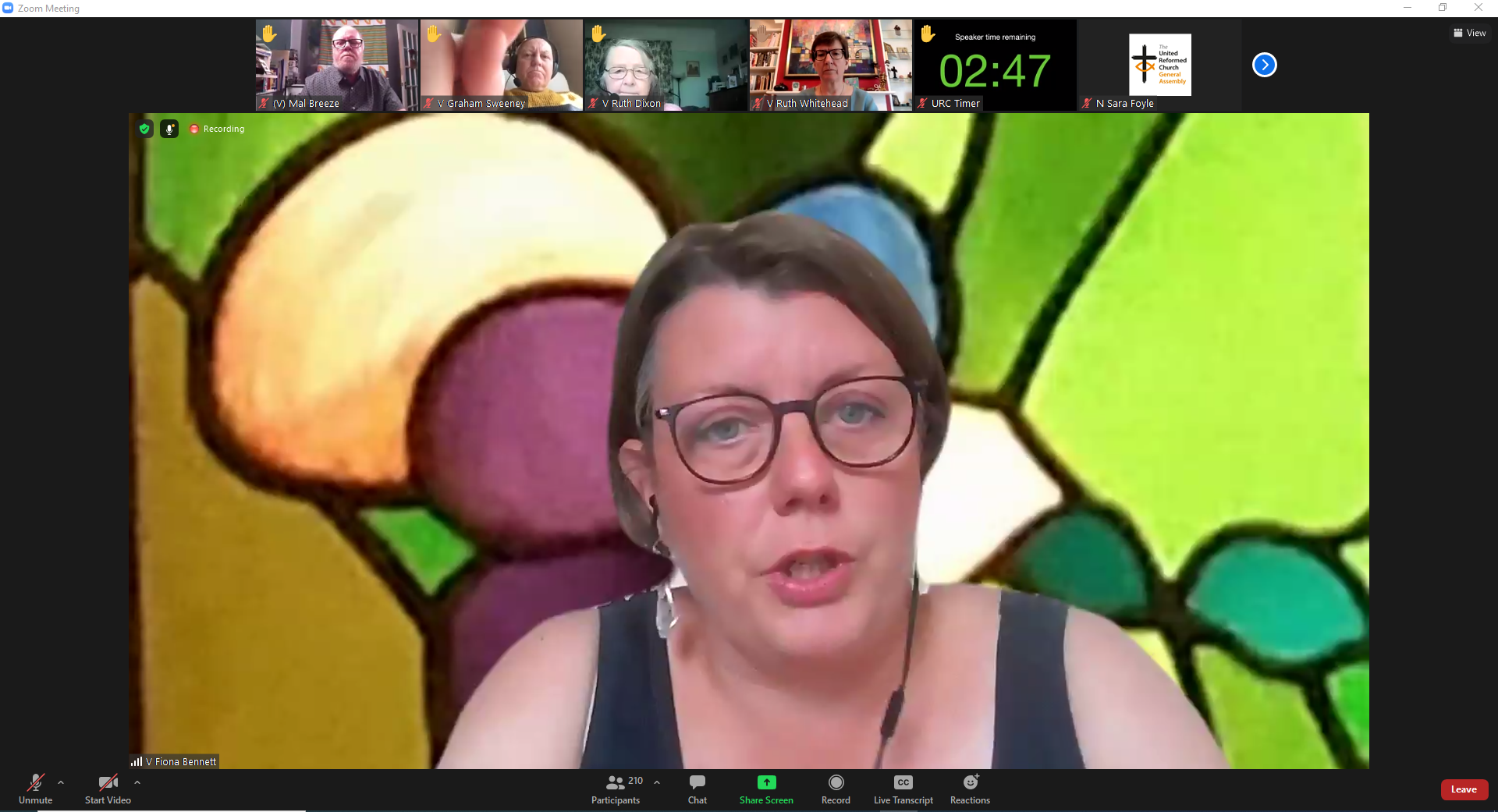 The result of the vote for Moderator of General Assembly was announced by the Revd Adrian Bulley, Convenor Business Committee: 208 votes were cast and the Revd Fiona Bennett, Minister of Augustine United Church, Edinburgh, was elected as Moderator. Mrs Everard led Assembly in prayer for both candidates.
The result of the vote for Moderator of General Assembly was announced by the Revd Adrian Bulley, Convenor Business Committee: 208 votes were cast and the Revd Fiona Bennett, Minister of Augustine United Church, Edinburgh, was elected as Moderator. Mrs Everard led Assembly in prayer for both candidates.
Ms Bennett will address the Assembly in its last session, on Monday.
Mission Council Report
John Bradbury presented the report from the Mission Council, which is now known as the Assembly Executive.
Mission Council oversees, prepares and sifts business between meetings of the General Assembly. It tries to keep a proper focus on the Church’s main concerns, so that all its work will further the mission of the gospel.
It also carries delegated power to deal on Assembly’s behalf with matters that require prompt attention of business at Assembly may enable Assembly ‘to take a more comprehensive view of the activity and policy of the Church’.
In order for Mission Council to be alert to the needs, concerns, opportunities and hopes of the whole body of the URC, people from the synods of the Church make up most of its membership.
The report was accepted by the General Assembly.
Session ten
Sunday Morning Worship
General Assembly’s worship on Sunday morning was led by the Revd Helen Everard, Chaplain to the Moderators. She was accompanied by Paddington Bear, who, she explained, has been making a pilgrimage across Wessex Synod.
The Revd Paul Robinson led Assembly in the hymn ‘The Kingdom of God is justice and joy’, and the Woking URC led ‘All through history’.
‘Most villains prefer’, written especially for Assembly by the Revd John Campbell, was sung by Flynn Everard and other members of the Everard family.
Jemima White read the story of King Herod and John the Baptist from Mark 6, with illustrations and models by Daniel Clarke.
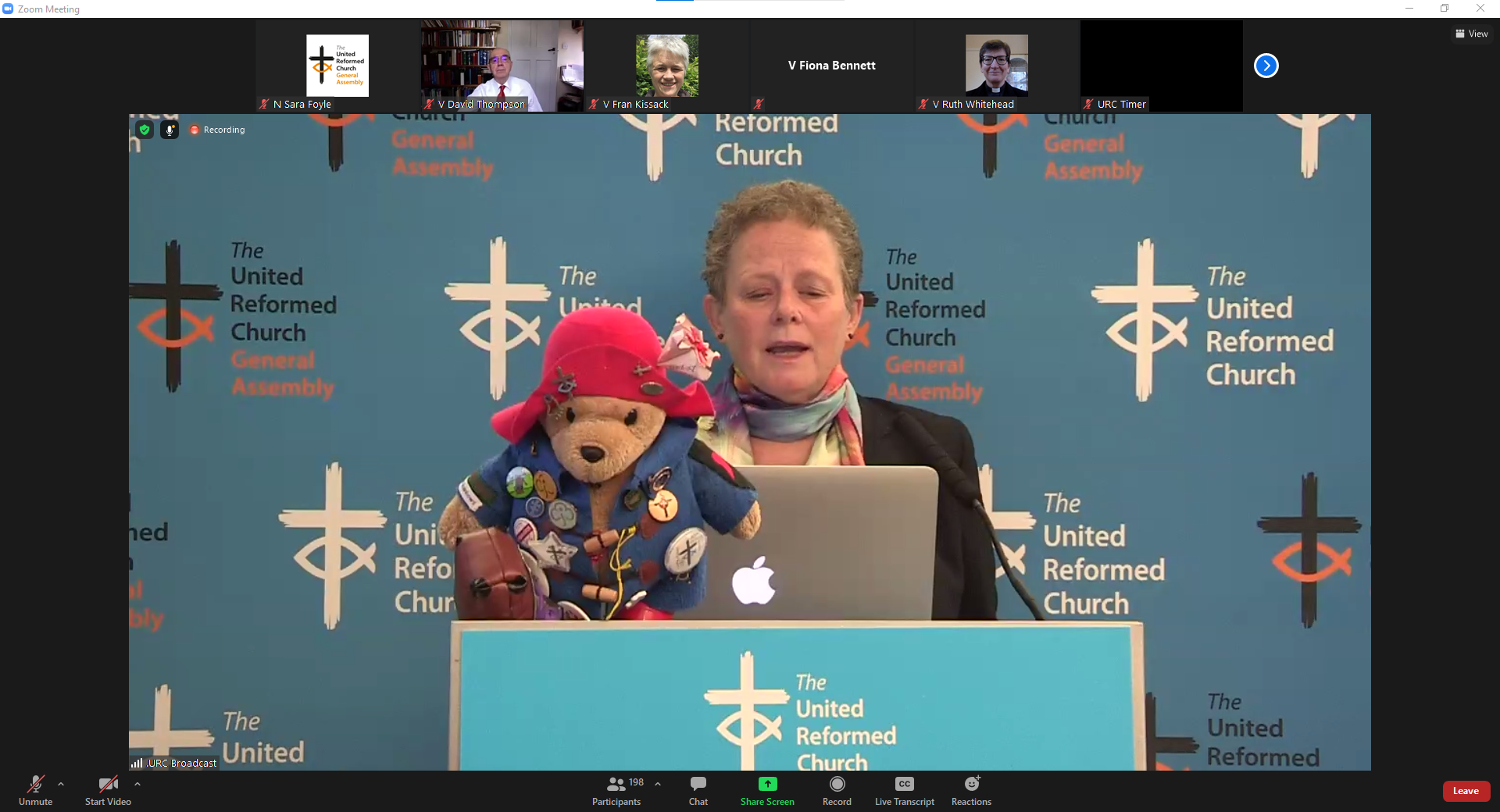 The Revd Clare Downing, Moderator of General Assembly, preached. Connecting the reading with the theme of ‘heroes and villains’, Ms Downing noted that heroism and villainy are not always easy to judge. Although John the Baptist is God’s spokesperson, he is disappointed in Jesus when he does not follow in his challenging ways. Herod seems to be a villain, and yet respects and listens to John. Even when it comes to Salome and Herodias, we do not have enough information to judge.
The Revd Clare Downing, Moderator of General Assembly, preached. Connecting the reading with the theme of ‘heroes and villains’, Ms Downing noted that heroism and villainy are not always easy to judge. Although John the Baptist is God’s spokesperson, he is disappointed in Jesus when he does not follow in his challenging ways. Herod seems to be a villain, and yet respects and listens to John. Even when it comes to Salome and Herodias, we do not have enough information to judge.
This Gospel reading, Ms Downing said, is “a reminder of the complexity of being human”. Similarly, this evening’s England match may lead to some players being cast as either heroes or villains, with no allowance for middle ground, though the truth will be more mixed.
The story raises the question of who we listen to, she said. Herod had to choose between John and Herodias, and we are surrounded by voices too. “Listening for the right voices – for God’s voice amongst the tumult – is not always easy, but is vital in our discipleship.”
Another question raised by the story is how we use whatever power we have. “Within the life of the church, we are to build one another up, to encourage each other, to work for the good of the whole world.”
Ms Downing concluded: “We may never be superheroes, but the call to be disciples should lead us to a place where we listen for God’s voice and exercise the power we have wisely and for the good of all, and where our deepest desires will be for the flourishing of the rule and mission of God.”
The closing hymn was ‘Eternal God, your love’s tremendous glory’ sung by Paul Robinson.
Session eleven
Ministerial Disciplinary Process and Incapacity Procedure
In Resolution 39, General Assembly adopted a large number of amendments to the Basis of Union and Structure of the URC, the procedure for dealing with cases of incapacity involving ministers and Church Related Community Workers (CRCWs), related panels and appointments to panels and commissions, and training to those bodies.
The paper was presented by Dr Janet Tollington and Dr Augur Pearce, members of MIND, the Ministerial Incapacity and Discipline Advisory Group.
In May 2019, Mission Council approved the preparation of a new process for dealing with cases of discipline involving Ministers and Church Related Community Workers. It directed MIND to proceed with the redrafting.
The first version of the Framework, the backbone of the new process, was seen by Mission Council at the May 2019. Since then, the Framework and Appendices have been reviewed by scrutiny groups, volunteer members of Mission Council and individuals with relevant experience from outside MIND, the Safeguarding Advisory Group, the Legal Adviser, Mission Council again, the Synod Moderators’ Meeting and the Ministries Committee.
The final version of the Framework and Appendices accompanied the report to the General Assembly.
Section O is broken beyond repair, Dr Tollington started, and has been revised many times. For example, there is no reference to safeguarding.
The sanctions and appeals of the process remain, but the new process is easy to understand.
There will be investigation teams to open proceedings to ensure that the complaint needs to go to the next stage of the process, and those who are appointed to those teams will remain, to ensure continuity of skills and expertise. “It’s not a life sentence,” Dr Tollington said. “These changes, if adopted, will benefit Ministers, complainants and the local church.”
The procedures will also be easier to amend in the future.
Augur Pearce asked the Assembly to trust the scrutiny that the changes had gone through over the past three years. And at times, costs will be reduced. The changes will also bring the processes and available disciplinary options closer together.
The incapacity procedure was also changed to reflect the changes made in the disciplinary process.
The Clerk and Mr Pearce told Scott Wheeler said that not all arrests and charges may lead to a disciplinary process, e.g. when ministers were arrested following a protest. If a minister is arrested then they should report that to their Synod Moderator, who will then decide how to respond.
Resolution 39 was carried.
Andrew Atkinson asked about the appropriateness of ministers cross examining complainants and witnesses. Dr Pearce said that alternative methods of cross examinations were available in the policy.
Jenny Mills and Megan Westgarth asked for additional visual leaning resources to be created to explain the process. Dr Pearce said that the current one would be updated and then shared to go alongside the process.
Rosalind Selby asked about financial support for those who are accused. There is no provision at the investigation stage, Dr Pearce explained, then the accused minister and investigation team to the assembly commission for costs to be met from church funds, for example for representation and expert witnesses.
Resolutions 40 and 41 were carried.
The General Secretary and the Clerk of the Assembly asked Assembly to accept an amended resolution which clarified a requirement about the appointments to panels by Synods.
After Dr Bradbury answered a question from David Turner asked about the appointments process, the resolution was carried.
Resolution 43 about the training for those serving on panels could be started in three or four weeks, Dr Tollington explained.
Judy Harris asked if Safeguarding could be involved with that training. The need to interact with safeguarding had been part of the development of the training, Dr Tollington explained, but safeguarding was part of this new process.
The General Secretary then moved resolution 39 be referred to Synods.
Resolution 5 – New Induction promises for Elders
General Assembly gave final approval in Resolution 5 to add a further question to Schedule B (of the Basis of Union) with immediate effect for Elders to answer:
Q: Do you promise as an Elder of the United Reformed Church to seek its well-being, unity and peace, to cherish love towards all other churches and to endeavour always so far as you are able to build up the one, holy, catholic and apostolic Church?
A: By the grace of God I do, and all these things I profess and promise in the power of the Holy Spirit.
Session twelve
URC Children and the future of Pilots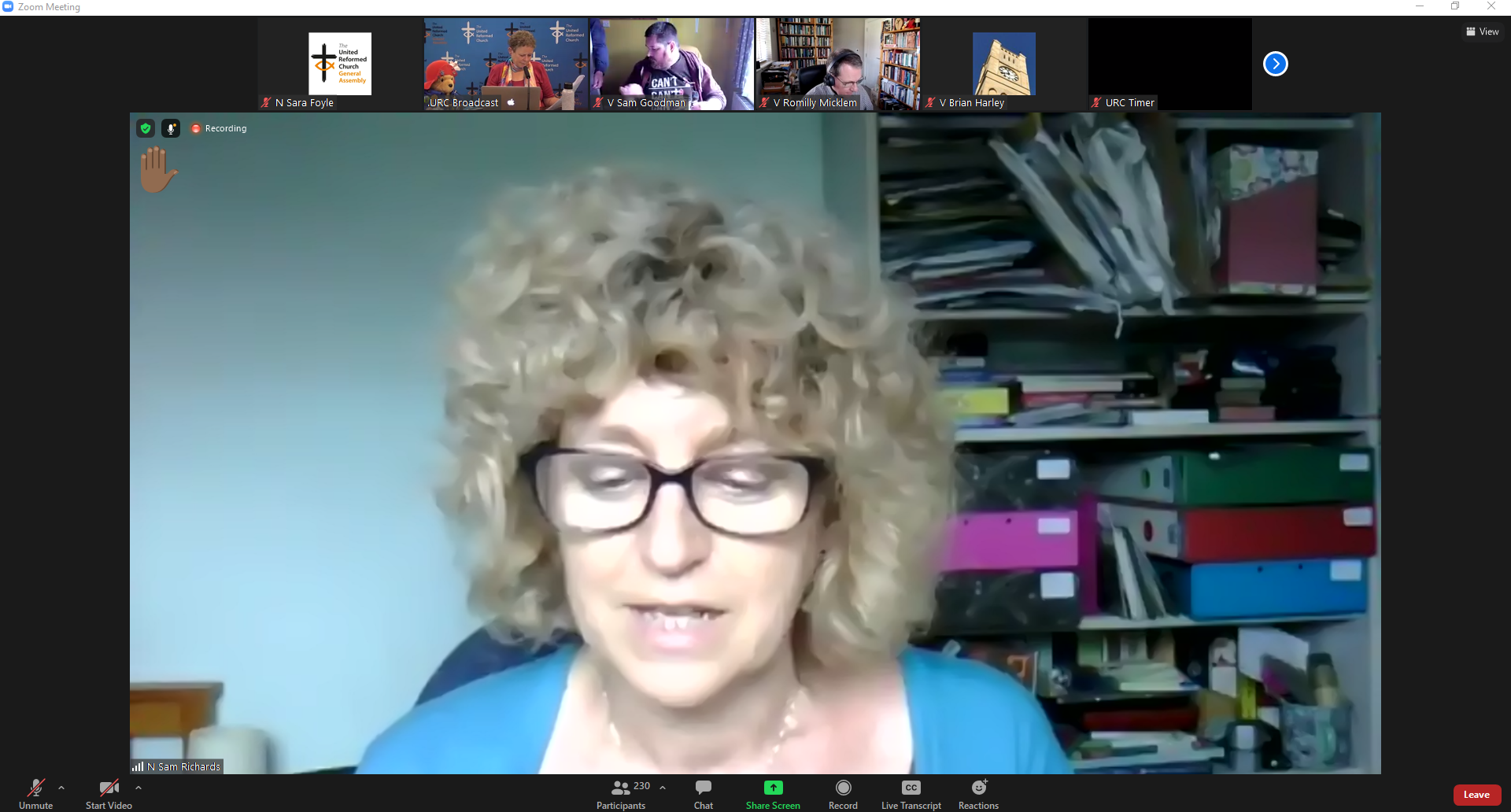 Sam Richards, Head of Children’s and Youth Work, presented ‘Children and Church’, a video in which children talked about their experiences of the past year, including what they missed about going to church during lockdown and how they continued to take part in it in other ways.
Sam Richards, Head of Children’s and Youth Work, presented ‘Children and Church’, a video in which children talked about their experiences of the past year, including what they missed about going to church during lockdown and how they continued to take part in it in other ways.
One child said: “It was definitely a lot harder, but never at one point did I feel I was not part of the church family.”
Members then split into groups to discuss what the children had said and how to support them. Dr Richards invited members of Assembly to give her direct feedback.
After another video, in which children talked about what they most liked about Pilots, the United Reformed Church children’s programme, the Revd Paul Robinson, Convenor of the Children’s and Youth Work Committee, presented Assembly with a series of resolutions on the future of children’s work.
He said that the proposals grew out of conversations that were full of ‘deep and growing appreciation for the good work that happens in local churches through Pilots, both now and in the past.’
He recognised the difficulties that children’s work had faced during lockdown. The proposals he brought before Assembly, he said, also reflected the declining number of Pilots companies and the wide range of good children’s work more generally in local United Reformed churches, which he said reached almost 30,000 children.
The resolutions propose creating a new umbrella, URC Children, to support all URC children’s work, no longer just focused on Pilots, to be launched at General Assembly in 2022.
Members of Assembly expressed warm appreciation of Pilots, and after a short discussion the resolutions were passed.
Paper B2: URC Committees and online meetings
Reuben Watt, URC Youth General Assembly Moderator, presented Paper B2 which highlighted that the number of people being able to fill roles on committees and attend meetings would be greatly improved if more meetings were held online.
Reuben expressed gratitude for the many contributions to General Assembly particularly by those aged under 26. But referring to the Nominations report, he noted, disappointingly, that since August 2020, only one person aged under 26 and no one aged 26 to 45 has accepted a nomination to join one of the URC committees.
He explained that the reason for this may be because most meetings take place in the middle of the afternoon, often in London; times and places that are inconvenient for many with work and study commitments.
Reuben said a culture shift was needed in the way the URC hosts and carries out meetings. Thanking the Equalities for its support, the Youth Moderator clarified that that the aim of the resolutions was not just aimed at making meetings more accessible for those aged under 26 but reducing the environmental impact that travelling to meetings can cause.
He said: “I really do believe that these resolutions will make a positive impact on our committees both at Assembly level, Synod level and church level.”
Comments in the information stage of the proceedings centred on the consultation process as some committees, colleges and synods holding meetings with young people were already holding such meetings online.
Reuben praised these efforts and asked them to continue and perhaps go even further, by directing attention to resolution 11 which encourages committee meetings and tasks groups to move onto holding 50% of meetings online.
Reuben also reminded General Assembly that the resolution was not just about being able to facilitate young people, but all those who find the status quo restrictive.
Regarding Resolution 11, concerns were raised about: the timing of meetings and the fact that they are often arranged by committee/task group members. A suggestion was made that, in order to prevent becoming too restrictive, a policy be made that the secretary and convenor of a committee/task group make it a point to review the timing of meetings when new people join; the impact and expectations on employees, particularly Church House staff who take minutes of meetings/task groups. They would suddenly be expected to work outside of their normal working hours without consultation; being able to sense the mood of the room and the Holy Spirit’s guidance not being as easy to judge online as it is in person; and the moderating and technical supporting of online meetings adequately.
The URC’s Legal Adviser reminded General Assembly to be wary of discussion and setting resolutions that involved aspects of changes to employees working hours as these were set in contracts, changes to which would need consultation. Reuben reminded General Assembly that resolution 11 was a request not an instruction.
Resolution 10 and 11 were carried with 12 being remaindered.
Resolutions 20 and 21 – URC Future Pensions
Assembly dealt with the remaindered business of Resolutions 20 and Resolution 21.
Following a question about timing by Ruth Whitehead, John Bradbury explained that the future of the pension funds relate to how the Church deals with the £45m deficit in the existing funds, something which is dependent on these resolutions.
Some Synod Trusts are happy to make a contribution to the gaps in the pension funds but would only do that as charitable trustees when a decision in principle has been taken to close this fund by the Assembly.
A delay could also impact the pensions of ministers, and attract questions from charity regulators.
Having set out the expectations of the fund, and making good provision for ministers, the Church needs to take this decision in principle, and there is also a wider question of stewardship, Dr Bradbury said.
After this, Ruth Whitehead and Romilly Micklem moved that the resolution Be Now Put.
In summing up, John Piper, URC Deputy Treasurer, said he had identified positive and negative reasons for the resolutions.
Nothing can change without the agreement of the General Assembly; concerns have been listened to; delays could cost £1.5 – 2m per year; changing the schemes would not stop the church from doing its best to care; we should trust those who will continue this work who, with God’s help, will continue this care; and trust us now not to propose changes that aren’t beneficial.
We could face accusations from churches that the pensions schemes no longer represent value for money, Mr Piper continued, and the Church budget for 2022, to be agreed in November by the Assembly Executive, could be drastically affected.
Resolution 20 was put and carried.
After some further clarifications and a request for consultation with trade unions, Resolution 21 was carried.
The Revd Helen Everard, Chaplain to the Moderators of Assembly, led a short session of worship on the last morning of General Assembly.
The Convenor of the Business Committee, the Revd Adrian Bulley, announced that contributions from members of Assembly would be reduced from three to two minutes, because of the amount of outstanding business to cover in the remaining sessions.
Session thirteen
Liminal times – the Synod Moderators’ Report
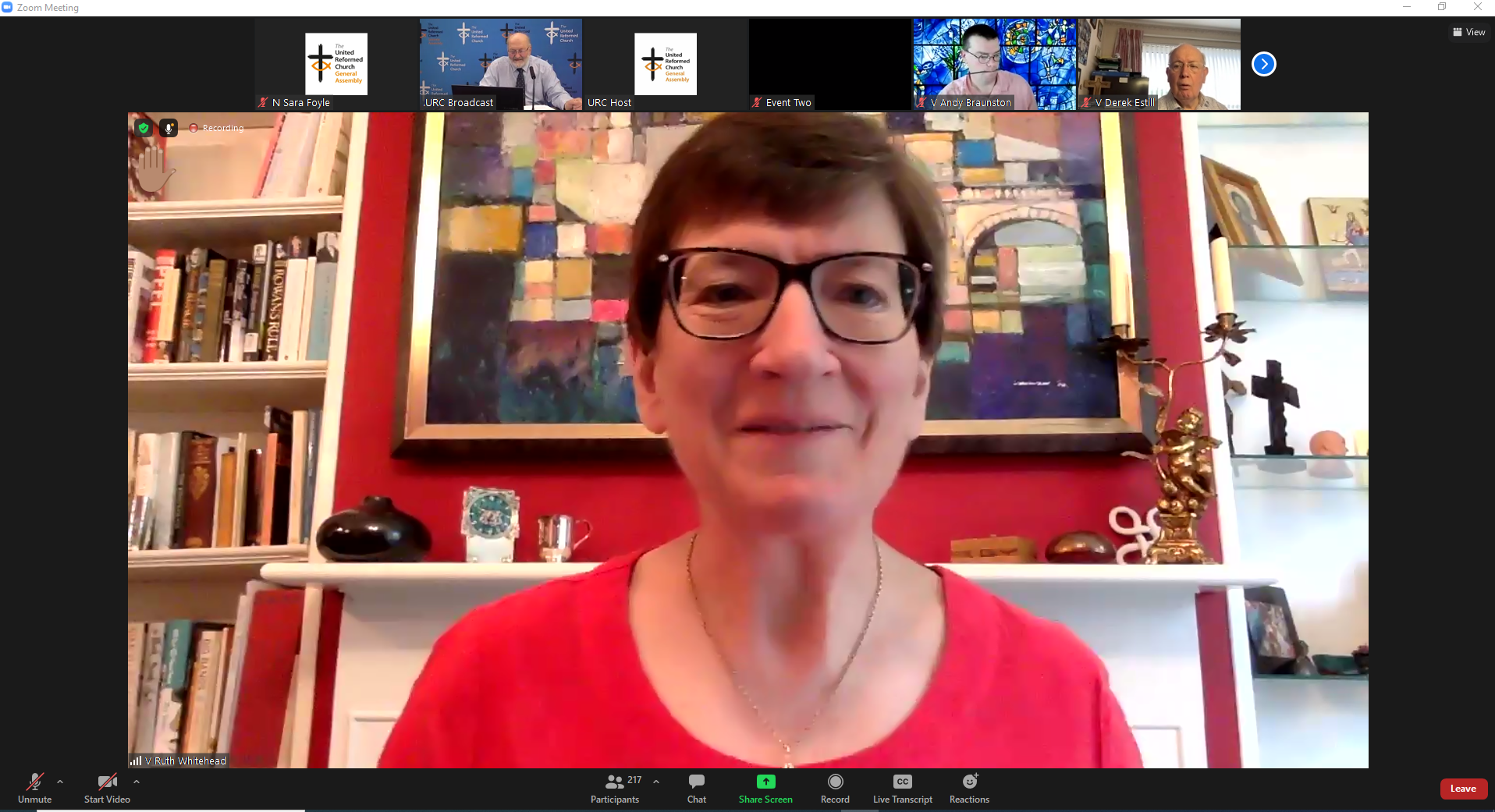 The Revd Ruth Whitehead, Moderator of the South Western Synod, opened the report from the Synod Moderators with a welcome to new members and thanks to those who have moved on.
The Revd Ruth Whitehead, Moderator of the South Western Synod, opened the report from the Synod Moderators with a welcome to new members and thanks to those who have moved on.
The Moderators asked: ‘where are we?’
“We are in decline as a denomination and we know we are not alone in that sense that our numbers are falling and our structures are creaking,” Ruth said.
“We are still in the midst of a global pandemic which has brought even more rapid change to so many aspects of life and has brought havoc and tragedy to many people. So as the traditional funeral service words say: ‘in the midst of life we are in death’.” These are liminal times – between times.
Ms Whitehead shared Richard Rohr’s description of liminal space: “…a unique position where human beings hate to be but where the biblical God is always leading them … It is when you are between your old comfort zone and any possible new answer. If you are not trained in how to entrust and wait, you will run…anything to flee this terrible cloud of unknowing.”
Liminal times are like a threshold, as the Church moves from one state to another, it recognises the change and pauses in the space. Or we can describe liminal times as like being in the fog – we can’t see clearly where to go.
“This is not the time to panic, or put the headlights on full beam, or slam our foot to the floor and hope for the best,” Ms Whitehead continued.
“Liminal times are like pupation. Like a caterpillar becoming a butterfly, we know we are changing, and that change is inevitable, but right now it’s hard to see the way forward.”
In liminal times, we need to be prepared to wait; to deepen our communal discernment; shape our institutional memory; clarify our purpose; see the way forward emerge; and how do we do each of these things?
We need to listen for God together in the Bible, prayer and in one another, to tell our story and remember who we were, who we are, and what our deepest guiding values are; to ask who God wants God’s church to be now, as an expression of God’s love for the world.
The URC needs to look for signs of green shoots of new life and new ways, emerging from the chaos.
In the Book of Reports there are examples of people engaging in each of these phases. The Synod Moderators hope local churches and others will explore your own response to liminal times together, perhaps using the questions to help you.
“Our greatest need in these liminal times is to trust God for wisdom.”
Ruth Whitehead returned to the funeral service and words from Deuteronomy: “The eternal God is your dwelling place and underneath are the everlasting arms”.
The Revd Dr Catherine Ball welcomed the report and signs of hope mentioned in the report, as did the Revd Naomi Young-Rodas who asked the church to stop talking about decline and start focussing on the green shoots.
The Revd Sam White, Principal of Westminster College, Cambridge, hoped that the work of the Resource Centres for Learning would continue to be part of the means to discern the new ethos of the church, and that the Moderators and their work remained in the thoughts and prayers of the Church.
John Piper echoed this and for the care of the Moderators had given over the past 18 months.
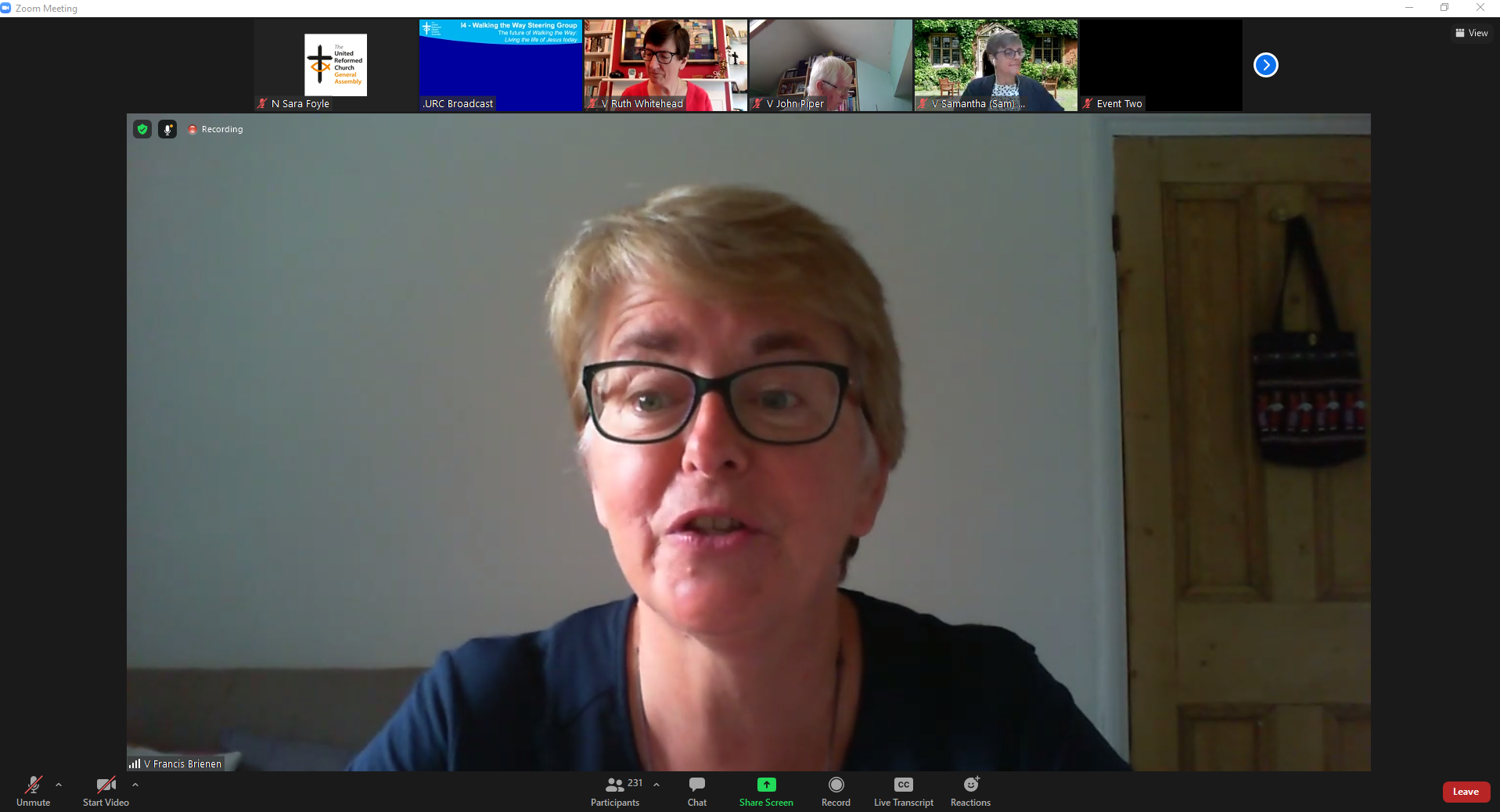 Paper I4: the future of Walking the Way: Living the life of Jesus today
Paper I4: the future of Walking the Way: Living the life of Jesus today
The future of Walking the Way: Living the life of Jesus today (Paper I4)
Francis Brienen, Deputy General Secretary (Mission), presented this paper to Assembly, on behalf of the Walking the Way Steering Group. Walking the Way is a focus on whole-life discipleship that the United Reformed Church has pursued in recent years. The resolution proposes to bring the work of the steering group to a conclusion at the end of 2022, and extend the post of Walking the Way Project Manager for a year until then.
Members of the Assembly expressed enthusiasm for the emphasis on whole life discipleship that Walking the Way has advocated, and discussed whether the present proposals were best way to facilitate it.
The Assembly agreed to an amendment in paragraph E of the resolution, changing ‘resources’ to ‘resources and relationships’.
The amended resolution was passed.
Session fourteen
Nominations
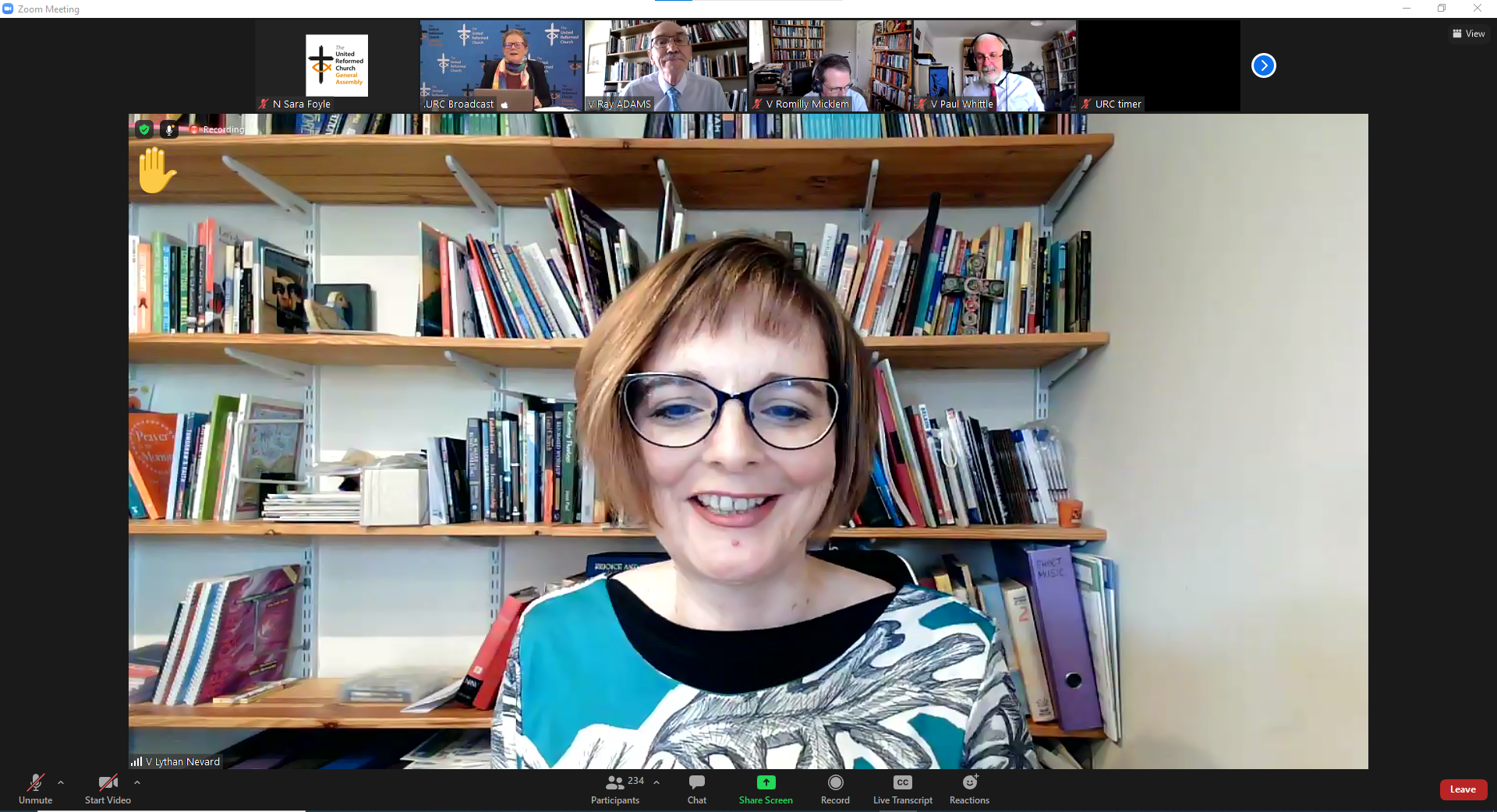 Paper J2: Eastern Synod Moderator
Paper J2: Eastern Synod Moderator
General Assembly appointed the Revd Lythan Nevard, a United Reformed Church minister (URC) currently serving at the Cornerstone ecumenical project in Cranbrook, Exeter, and previously a minister in Hartlepool, Romford, Brixham and Babbacombe, to serve as the next Moderator of Eastern Synod until 2028.
The nomination follows the move by the Revd Paul Whittle to serve as Moderator of the URC National Synod of Scotland.
Lythan was a member of the URC’s Ginger Group in the 1980s, a group of young people that visited churches around the country, leading a variety of church related projects, based at Yardley Hastings.
Lythan grew up in the United Reformed Church – her father is the Revd Ivor Rees, a URC minister who served at Clapham, Ewell, Swansea and Bamford.
Her husband, the Revd Phil Nevard, is a URC Minister currently serving Kingsteignton and the South Western Synod who has accepted a call to serve three churches in the Eastern Synod – Castle Camps, Whittlesford and Sawston. Lythan and Phil met while serving together on the Ginger Group.
On the announcement of her nomination, Lythan said: “The Holy Spirit has led me on many adventures, and I am both delighted and awed that the next one is as Moderator of Eastern Synod. I’m really looking forward to working with the churches and Ministers of the Synod and finding out how we can grow in discipleship and serve God’s kingdom together.”
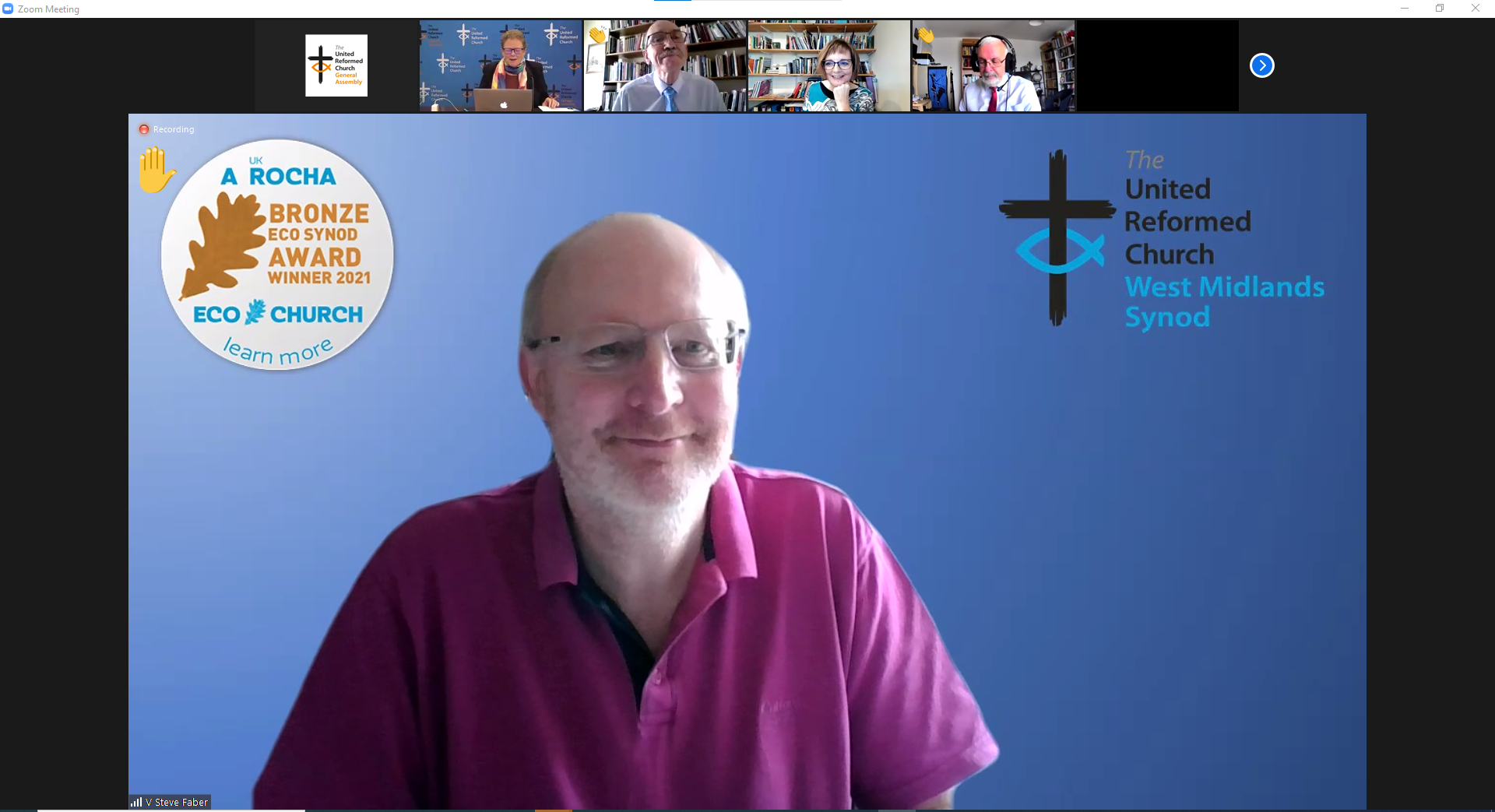 Paper J4: West Midlands Synod Moderator
Paper J4: West Midlands Synod Moderator
General Assembly appointed the Revd Steve Faber, to extend his role of Moderator of the West Midlands Synod. Steve’s second term will run from 1 September 2022 to 31 August 2027.
Steve began the role of West Midlands Synod Moderator in September 2015, and has been praised for his leadership through a period of transition in the region, his commitment to pastoral presence within the churches of the Synod and appreciation of his work providing guidance for the whole church during the Covid 19 pandemic.
In March, the Synod became the first in the denomination to achieve the A Rocha Bronze Eco Synod award.
The Revd Clare Downing, Moderator of the General Assembly, thanked Steve for leading the URC’s advice to churches on the Covid-19 pandemic.
Mission Council – Appendix Two: A Minister for Digital Worship post
This paper was originally introduced to General Assembly by the Revd Dr John Bradbury in session nine but was remaindered to session 14 following lively discussions.
The paper focuses on making the Daily Devotions and Daily Devotions Sunday service an integral part of the life of the URC. The Devotions began as a personal initiative of the Revd Andy Braunston and now reaches around 4,000 people daily. Around 1,500 access the Daily Devotions Sunday Service, which started as a result of people not being able to access local church services during the pandemic.
However, Andy has a full-time ministry around which he fits the work of the Daily Devotions and it is becoming increasingly hard for him to do so, despite receiving help from Dan Morrell who has been providing Andy with temporary support.
The position would be full-time, for a term of seven years, and based at Church House so that support can be received from the Communications Team.
Points of discussions included whether the post could not be limited to an ordained Minister and whether it could be a offered on a part-time basis; whether the contract term could be three years not seven.
John advised because sacramental worship was at the heart of the ministry, it was appropriate for the post to be for a Minister of Word and Sacrament, and offering the role on a part-time basis would mean that that existing digital ministries such as the Daily Devotions would simply continue to as is, rather than develop and grow further.
Concerns were also raised about the exclusion of other digital ministries that have flourished during the pandemic such as Churspacious which provides worship, discipleship, Bible study, and pastoral care.
The General Secretary also committed to having further discussions about finding a way through for other existing digital ministries, such as Churspacious, so concerns and hopes could be fully heard and to see what could possibly be done so that it has life beyond the next 10 months. To aid these discussions and explorations of the person appointed to the post, a proposal was made which was named resolution 3b which read:
General Assembly also directs the General Secretariat to explore the creation of a role within the United Reformed Church that most effectively embraces:
1. The development of hybrid church
2. The incorporation of online congregations into our church structure
3. Maximising the opportunities afforded by virtual forms of church for mission, outreach, evangelism and the development of discipleship.
Other suggestions were made that the post be for three years instead of seven, and what was now called resolution 3a and 3b be not put for further work to be made, and that the resolutions be divided into two separate posts, however votes on these proposals were not carried and the resolutions, 3a, 3b and 4, originally written following amendments were carried.
Session fifteen
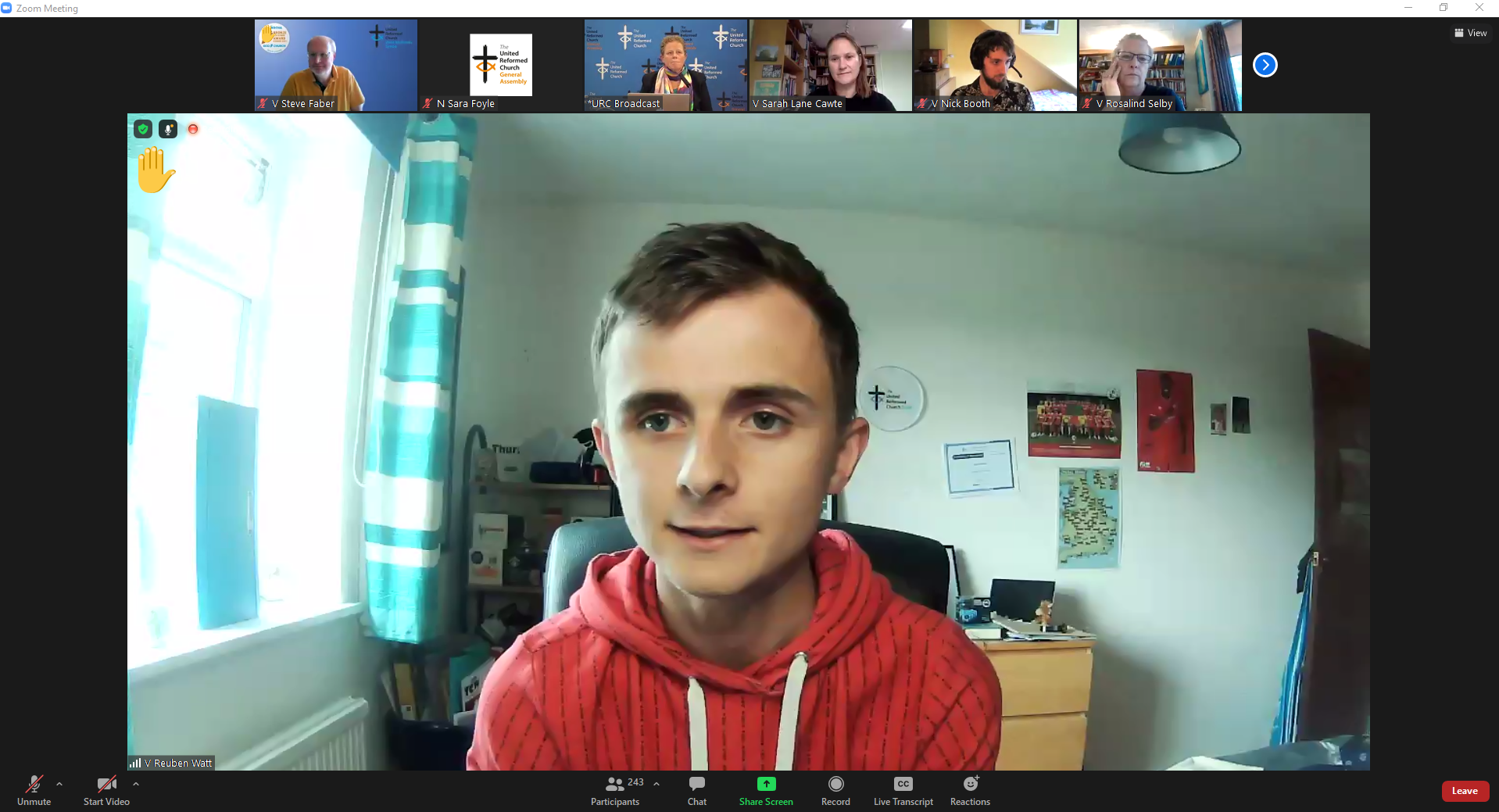 Paper B2: URC committees and online meeting
Paper B2: URC committees and online meeting
Discussions resumed regarding Resolution 12, after resolutions 10 and 11 were passed in session 12 of the Assembly. The resolution was carried.
General Secretary’s Report on Disciplinary Cases
The Revd Dr John Bradbury, as required under the Process for Ministerial Discipline, reported to report General Assembly on cases that have been brought to completion since the Assembly last met. He advised that two Section O cases had been completed since Assembly met in 2020, which had incurred costs totalling just under £26,000. One minister was deleted from the roll of ministers.
The Revd Helen Everard then said a prayer for all those involved with the disciplinary process.
Moderator-elect acceptance speech
Address to the throne
The Address to the Throne was adopted by the General Assembly. The text is available on the General Assembly papers page of the URC website.
Closing worship
General Assembly concluded with worship led by the Revd Helen Everard. The Revd Paul Robinson led Assembly in the hymn ‘Sing of the Lord’s Goodness’.
The Revd Paul Holmes, a hospital chaplain in Coventry, led the Bible Study on the story in Luke 8 of a woman being healed by touching the hem of Jesus’s robe. The reading was presented by young people in a video.
Mr Holmes said that the story illustrated the work of a chaplain, and indeed any kind of ministerial work. It is a story of the restoration of physical and mental health, of hope, and the fulfilment of a person’s potential. This happened, he said, because the woman’s relationship with God enabled her to touch Jesus. Relationships should be at the heart of what we do – relationships with Christ, with members of our congregation, with our synods. Are these relationships of ours healthy?
This is also a story of presence, said Mr Holmes. The woman went and touched Jesus because he was present. We have to be present so people can come to us. We have to be seen.
Mr Holmes ended with a challenge: ‘This lady is a real heroine because she was prepared to fall at the feet of Jesus, knowing she needed help. Are we prepared to do that?’
Worship concluded with reflections from young people on the theme of coming close to God, and with the song ‘All Through History’ led by Woking URC band.
Induction of the Deputy General Secretary (Discipleship)
Mr Peter Pay led the induction of the Revd Adrian Bulley into the role of URC Deputy General Secretary (Discipleship), saying God gives a variety of gifts and calls each of us to serve according to those gifts and the needs of the world.
The Revd Adrian Bulley then took to the stage and expressed his surprise at the sequence of events, after believing his life had been “pretty well mapped out”.
But what started as a request for help began to feel to him as a calling.
“As is so often the case, God had other plans for me. Somewhat different plans to those which Ann [his wife] and I thought we’d made,” he said. “And so I find myself on the cusp of new challenges, new relationships, new responsibilities, new experiences, trusting that the God who has been with me thus far through life, even when I didn’t know it at the time, and who has brought me to this point, will support and equip me going forward.
“That’s discipleship. Stepping, striding, stumbling forward in faith. Following where God leads, learning and growing as we travel.
“May God bless me and us all as we step forward together.”
The Statement concerning the Nature, Faith and Order of the URC was then read.
At the direction of the General Assembly Moderators, Adrian affirmed his faith and commitment to his new role and promises were then made by General Assembly which confessed faith in one God: Father, Son and Holy Spirit, to receive Adrian into his ministry and to pray for, encourage and support him.
Peter then declared Adrian to be inducted into the role and Clare led a prayer for him, at the end adding: “It is good to know that some of those areas of the life of the Church which need oversight will have you as a safe pair of hands holding on to them.”
On behalf of Francis Brienen (Mission), Jane Baird (Admin and Resources), and himself, the Revd Dr John Bradbury welcomed Adrian to the General Secretariat and called him a great blessing to the team.
Reporting by Andy Jackson, Ann-Marie Nye, Steve Tomkins
